

Argumentative Essay | The Ultimate Guide | O Level (1123)
If you want to know how to write a perfect argumentative essay , you will love this complete step-by-step guide I am about to share with you.
In fact, these are the exact strategies I used to ace this question in my English exam.
So keep reading.
But first of all, let me give you a brief introduction to the topic.
We'll take a look at:
What is an Argumentative essay?
You have heard of an argument, right? In simple words, it is the opposition or disagreement over something.
Argumentative writing is a genre (category) of writing in which you either speak in favour of a topic or against it. Plus, you use facts and examples to support your point of view.
Pretty simple, isn’t it?
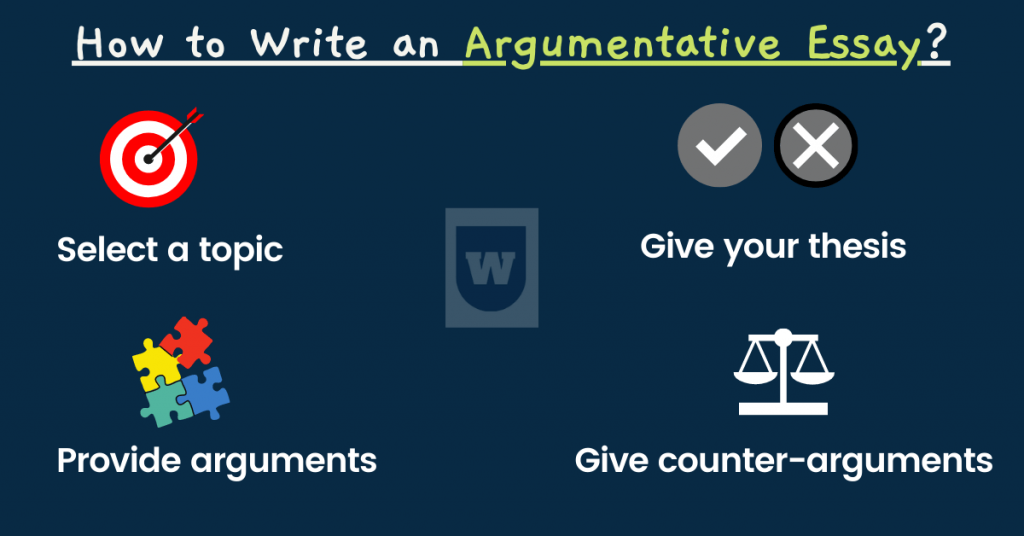
In short, a well-written essay will:
- Have a compelling topic introduction to engage the readers
- Have a fair analysis of both sides of the argument
- Persuade the reader to consider a (new) different perspective
Do not worry! We will take a look at each of them in detail.
But first of all, let me tell you how to properly select a topic before writing.
How to select the “right” topic?
If you want to know, how to properly select a topic, this is for you.
Look, selecting a topic can be crucial . Here is a simple example for you:
Question 1 : ‘Sport is not just good for exercise – it teaches us lessons about values and behaviour.’ Do agree? Give reasons and examples to support your view.
Question 2 : ‘We should always obey rules, both inside and outside school: there is never an excuse for breaking them.’ What is your opinion? Give reasons and examples to support your opinion.
Let’s suppose that these were the topics you were to choose one from. What would you do? Here is a simple step-by-step guide for you.
- First of all, read both the questions twice and underline the keywords.
- Then, make a brief (but quick) mind-map . This will show you how much information you have for the particular topic.
- Select the topic that you find more interesting (and of course, for which you have better arguments).
Note : During the exam, MANY students just skim through the question (because they think they are running out of time). You DO Not have to do this. Take your time and decide which topic you will attempt.
When you know which topic to write on, it is time to move straight on to the next topic.
Format of Argumentative Writing:
Here is the format that you are going to use in your writing, “ the five-paragraph structure “.
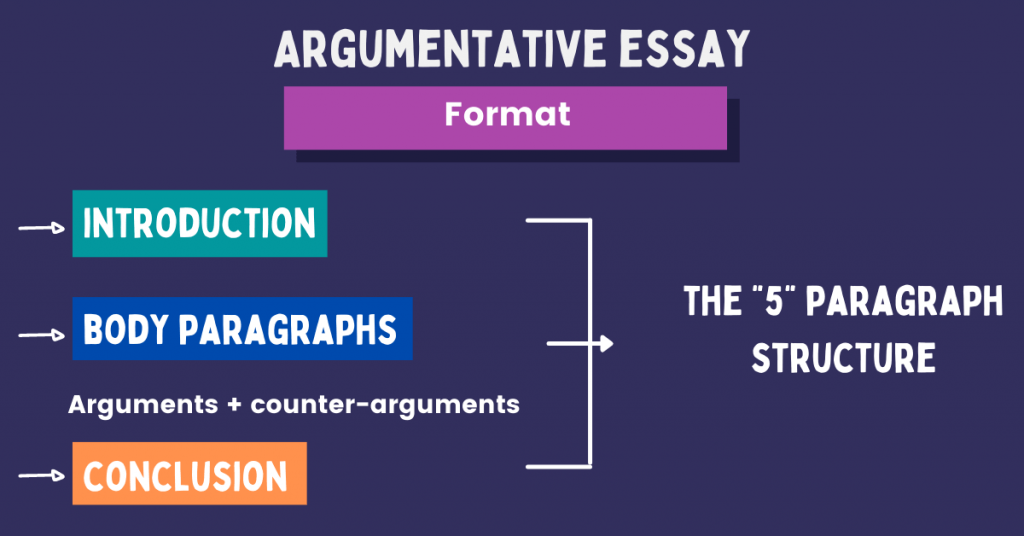
Let’s take a look at each of them in detail now:
- Introduction
- Body Paragraphs (for arguments and counter-arguments)
Before moving ahead, let me tell you that each of these three sections has a unique structure . Let me show you how.
Introduction:
What do you know about an introductory paragraph already? The first part of your essay explaining what you are going to cover?
But here is a catch.
The introductory paragraph for an argumentative essay is divided into three parts :
Part 1 : Hooking your reader (grabbing the attention)
Part 2 : Background information
Part 3 : Thesis statement
Let me explain each part to you in detail.
The first thing you are going to do is to engage your reader (grabbing the attention). Look, a good introduction is the one that entices (attracts) the reader.
But, how can you hook your reader? Here are the three things you can do:
- Throw up questions :
Sometimes, a couple of questions straight away can be enough to grab your readers attention (as you will see in the example below ).
When you put questions in front of your readers at the start, chances are that they will go through the entire passage (essay) to find answers to those questions.
- State a fact:
Think of this: Will you be engaged by the passage that mentions a fact or an interesting finding straight away?
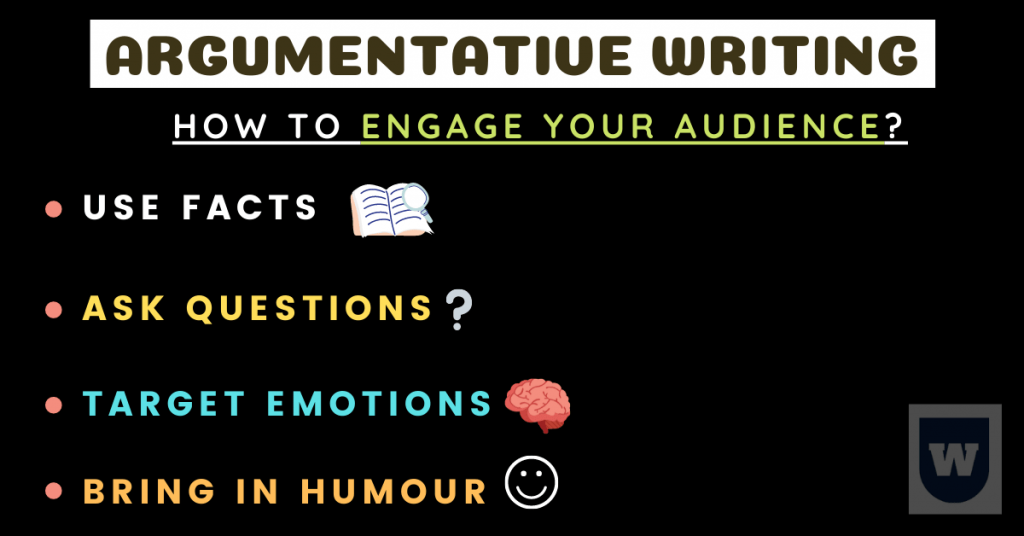
I would! And good chances are that you would also be.
So if you know a fact about a topic , you can simply start off with that as well. For example, the first line for the topic “Is a university degree enough to get a good job?” can be:
“Do you know that graduates still out-earn people without degrees…”
Now, let’s move on.
The second thing you have to do is to give some background information .
Here’s why.
This will help your reader understand what the topic is all about . Plus, this information will also explain the main keyword as well.
So after grabbing your readers attention, give some background information so that your reader understands the main context and the problem.
When you are done with these two parts, move on to the third and the most important part of the introduction, the thesis statement .
In simple words, this statement lets your reader know about your viewpoint (opinion) about the topic.
And if I say that this one-to-two sentence statement presents the main idea of your essay, I will not be wrong. Plus, your thesis is the MOST important part of your introduction.
Note : Your thesis should be “crystal clear”. This means that you should clearly give your opinion about the topic.
Further Reading:
How to get an A* in O Level English | 7 Best Tips
Narrative Writing Made Simple | Format and Sample
Account Writing | Directed Writing
Now, here is a simple example of an introduction for you:
The Question says:
“The students who study abroad achieve greater success”. Do you agree or disagree? Give reasons for your answer.
“Do you know that US students studying abroad during 2018-2019 increased by 1.6% (from 341,751 to 357,099)? But, does that mean studying abroad promises greater achievements? (Hooking the readers) For years, many students are interested in studying abroad as it helps them to have an understanding of the world, learn new languages, overcome challenges of living in another place and appreciate other cultures. To be precise, America’s first study abroad program (started by the University of Delaware ) was launched in 1923. (Background information) In my opinion, the students who study abroad achieve greater success because they develop their skills in a better way than those who study do not study abroad.” (Thesis statement)
With this, it is time to move on and talk about the body paragraphs.
Body Paragraphs:
An argumentative essay contains three body paragraphs (can be more) that give reasons and explanations on why you support your thesis.
Plus, you also give one or two counter-arguments (the arguments that oppose your thesis) to create a balance.
You should know that a typical paragraph contains a topic sentence (telling why your reader should agree with your opinion), examples and studies etc.
Note : You will apply the inverted pyramid technique over here. This simply means that you will give your strongest argument first (followed by the relatively weaker one).
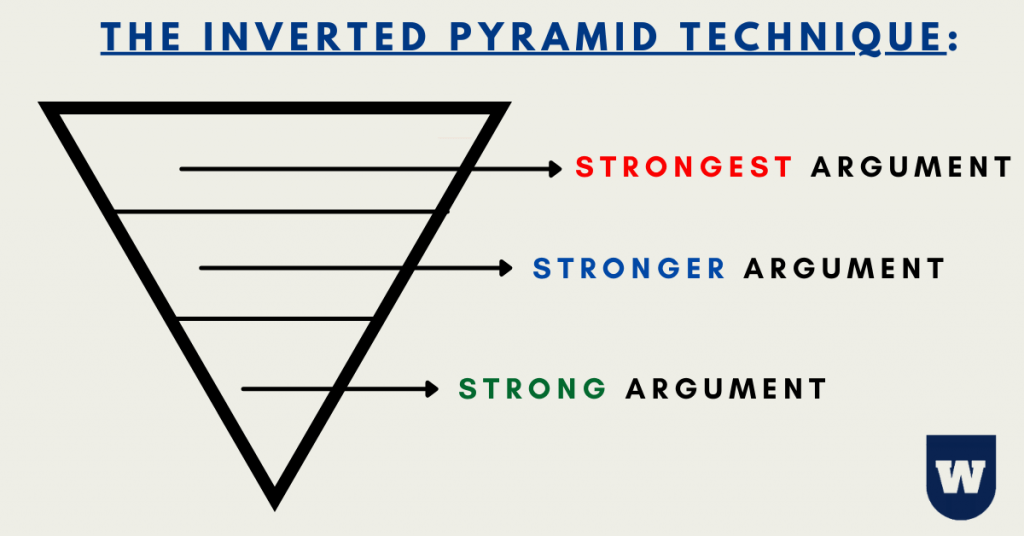
Let’s take a look at this example:
Here is a paragraph in favour of the topic: “ Skills are more important than knowledge “.
Einstein said: “Imagination is more important than knowledge…” He further explained that knowledge is limited, while imagination encircles the world. All the information in this world is useless unless it is used in creative ways. For example, if a person knows a lot of facts, it is impressive. But, it is not useful. On the other hand, skills make information management and innovation (the most desired in the business world). In short, skills are what bring about development because they are practically applicable.
Now, here is a counter-argument paragraph for the same topic.
However, some people say that knowledge is more impotent than skills. The reason being is that skill is the end product of knowledge. If you have good knowledge about how to set a camera for a shoot, then you can practice that knowledge and the practice over time will make you skilful for that work. And since knowledge is an accumulation of experiences, it is more important.
In short, you support your thesis (that you made in the introduction) in the body paragraphs.
This takes us straight to the next part, the conclusion.
The Concluding Paragraph:
I have a question from you: What do you know about a conclusion, apart from that it is the last paragraph of your essay?
Let me tell you.
This is the paragraph where you re-state your thesis . Plus, you also give a brief summary of the arguments you made in the essay above.
Remember that conclusion is NOT the place to introduce new points. In fact, to write a good conclusion, you will have to appeal to your reader’s emotions.
We will take a look at all this with the help of an example.
Here is the concluding paragraph for the topic: “Skills are more important than knowledge.”
“In short, yes skills are more important than knowledge because skills can be practically applied. Moreover, skills lead towards development and birth innovation. But, knowledge is also important if it is practically applied.”
With this, let me share some amazing tips for you if you want to ace this topic in your exam.
Tips for Argumentative Writing:
- Make your thesis crystal clear .
As I said above as well, you HAVE to state your thesis clearly.
For example, if you agree that “money can’t buy you happiness”, then state clearly : In my opinion, Yes! money cannot buy you happiness.
As just a quick reminder for you, the thesis will be mentioned in the introduction as well as the conclusion.
- Be convincing .
Here’s a deal.
If you want your essay to stand out, you have to be persuasive (convincing). But, how can you do so?
Firstly, remember that people are easily persuaded by logic. Therefore, you have to give strong arguments in favour of your claim.
Quick Tip : Before writing anything, make a rough draft where you write all the arguments you have. Then, shortlist the MOST convincing arguments.
The second thing you can do is to use plenty of facts , examples and anecdotes (your personal story or experience) to support your claim.
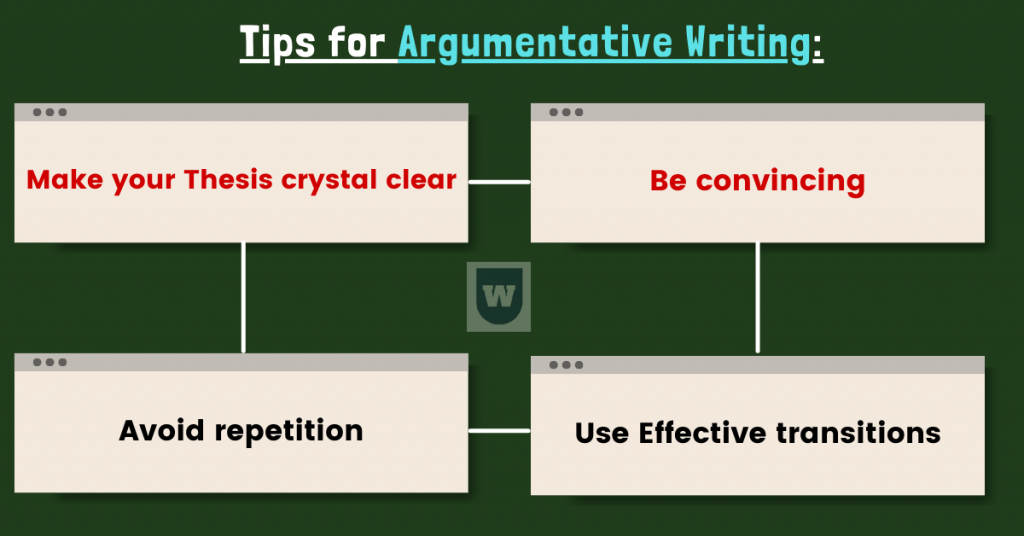
Let’s suppose that you are writing on the topic: “University degree is more important than skill.”
In support of this argument, you could have stated that the 2016/17 HESA survey shows that 81% of people who finished their undergraduate degree three years ago are in full or part-time work.
In short, try to use case studies, facts and examples to support your opinion. Do not JUST give your opinion, but back it up as well.
- Use effective transitions .
Now you might be wondering, what are effective transitions. These are the words (or phrases) that connect your ideas and paragraphs , effectively.
Simple isn’t it.
Effective transitions are essential if you want to create coherence (logic and unity).
Here is a list of transition words that you can use in your writing.
For similarity : In addition, In the same way, similarly, identically etc.
For Opposition : Besides, in contrast, on the contrary, unlike and above all etc.
For examples and support : For instance, specifically, to illustrate, undoubtedly and especially etc.
So, create unity and link between your arguments, as they help the reader to (better) understand your claim.
- Avoid repetition :
Let’s be honest.
This is the biggest issue in argumentative writing. And, this problem can really impact your grade.
In simple words, repetition is talking about the same ideas (point) multiple times. This usually happens when you run out of unique ideas .
Remember that repetition makes your response unconvincing . Here is how can you deal with it:
First of all, make a rough draft before writing and write down all the points that come to your mind. When you will have all points in front of you, good chances are that you will not repeat any argument.
The second thing you can do is to read your writing aloud . Look, it is easy to lose track of what you are writing.
So when you read your work aloud, you will remember what you are writing . As a result, you will not repeat the same point.
Wrapping Up:
With this, our topic of how to write an argumentative essay has come to an end.
Now I turn it over to you.
Which part of this topic do you find the most challenging? Is it writing relevant facts or writing strong arguments. Do let me know.
Remember that this topic is very important from an examination point of view for GCE O Level English (1123). So, do practise a couple of past paper questions as well.
Thank you for reading and staying with me till the end. Stay tuned for more.
Leave a Reply Cancel reply
Your email address will not be published. Required fields are marked *
Save my name, email, and website in this browser for the next time I comment.
Argumentative Essay Writing
Argumentative Essay Examples

Best Argumentative Essay Examples for Your Help
Published on: Mar 10, 2023
Last updated on: Jan 30, 2024

People also read
Argumentative Essay - A Complete Writing Guide
Learn How to Write an Argumentative Essay Outline
Basic Types of Argument and How to Use Them?
Take Your Pick – 200+ Argumentative Essay Topics
Essential Tips and Examples for Writing an Engaging Argumentative Essay about Abortion
Crafting a Winning Argumentative Essay on Social Media
Craft a Winning Argumentative Essay about Mental Health
Strategies for Writing a Winning Argumentative Essay about Technology
Crafting an Unbeatable Argumentative Essay About Gun Control
Win the Debate - Writing An Effective Argumentative Essay About Sports
Make Your Case: A Guide to Writing an Argumentative Essay on Climate Change
Ready, Set, Argue: Craft a Convincing Argumentative Essay About Wearing Mask
Crafting a Powerful Argumentative Essay about Global Warming: A Step-by-Step Guide
Share this article
Argumentative essays are one of the most common types of essay writing. Students are assigned to write such essays very frequently.
Despite being assigned so frequently, students still find it hard to write a good argumentative essay .
There are certain things that one needs to follow to write a good argumentative essay. The first thing is to choose an effective and interesting topic. Use all possible sources to dig out the best topic.
Afterward, the student should choose the model that they would follow to write this type of essay. Follow the steps of the chosen model and start writing the essay.
The models for writing an argumentative essay are the classical model, the Rogerian model, and the Toulmin model.
To make sure that you write a good argumentative essay, read the different types of examples mentioned in this blog.
On This Page On This Page -->
Good Argumentative Essay Examples
Argumentative essays are an inevitable part of academic life. To write a good argumentative essay, you need to see a few good examples of this type of essay.
To analyze whether the example is good to take help from or not. You need to look for a few things in it.
Make sure it follows one specific model and has an introductory paragraph, organized body paragraphs, and a formal conclusion.

Get More Examples From Our AI Essay Writer
How to Start an Argumentative Essay Example
Learning how to start an argumentative essay example is a tricky thing for beginners. It is quite simple but can be challenging for newbies. To start an argumentative essay example, you need to write a brief and attractive introduction. It is written to convince the reader and make them understand your point of view .
Add body paragraphs after the introduction to support your thesis statement. Also, use body paragraphs to highlight the strengths and weaknesses of your side of the argument.
Write a formal conclusion for your essay and summarize all the key elements of your essay. Look at the example mentioned below to understand the concept more clearly.
Check out this video for more information!
Argumentative Essay Example (PDF)
Argumentative Essay Example
Argumentative essays are assigned to university students more often than the students of schools and colleges.
It involves arguments over vast and sometimes bold topics as well.
For university students, usually, argumentative essay topics are not provided. They are required to search for the topic themselves and write accordingly.
The following examples will give an idea of how university students write argumentative essays.
Argumentative Essay Example for University (PDF)
Argumentative Essay Examples for College
For the college level, it is recommended to use simple language and avoid the use of complex words in essays.
Make sure that using simple language and valid evidence, you support your claim well and make it as convincing as possible
If you are a college student and want to write an argumentative essay, read the examples provided below. Focus on the formatting and the vocabulary used.
Argumentative Essay Example for College (PDF)
College Argumentative Essay Sample (PDF)
Argumentative Essay Examples for Middle School
Being a middle school student, you must be wondering how we write an argumentative essay. And how can you support your argument?
Go through the following examples and hopefully, you will be able to write an effective argumentative essay very easily.
Argumentative Essay Example for Middle School(PDF)
Middle School Argumentative Essay Sample (PDF)
Argumentative Essay Examples for High School
High school students are not very aware of all the skills that are needed to write research papers and essays.
Especially, when it comes to argumentative essays, it becomes quite a challenge for high schools to defend their argument
In this scenario, the best option is to look into some good examples. Here we have summed up two best examples of argumentative essays for high school students specifically.
Argumentative Essay Example for High School (PDF)
High School Argumentative Essay Sample (PDF)
Argumentative Essay Examples for O Level
The course outline for O levels is quite tough. O levels students need to have a good command of the English language and amazing writing skills.
If you are an O-level student, the following examples will guide you on how to write an argumentative essay.
Argumentative Essay Example for O Level (PDF)
Argumentative Essay for O Level Students (PDF)
5-Paragraph Argumentative Essay Examples
A 5-paragraph essay is basically a formatting style for essay writing. It has the following five parts:
- Introduction
In the introduction, the writer introduces the topic and provides a glance at the collected data to support the main argument.
- Body paragraph 1
The first body paragraph discusses the first and most important point related to the argument. It starts with a topic sentence and has all the factual data to make the argument convincing.
- Body paragraph 2
The second body paragraph mentions the second most important element of the argument. A topic sentence is used to start these paragraphs. It gives the idea of the point that will discuss in the following paragraph.
- Body paragraph 3
The third paragraph discusses all the miscellaneous points. Also, it uses a transitional sentence at the end to show a relation to the conclusion.
The conclusion of a five-paragraph essay reiterates all the major elements of an argumentative essay. It also restates the thesis statement using a more convincing choice of words.
Look at the example below to see how a well-written five-paragraph essay looks like
5 Paragraph Argumentative Essay Example (PDF)
Argumentative Essay Examples for 6th Grade
Students in 6th grade are at a point where they are learning new things every day.
Writing an argumentative essay is an interesting activity for them as they like to convince people of their point of view.
Argumentative essays written at such levels are very simple but well convincing.
The following example will give you more detail on how a 6th-grade student should write an argumentative essay.
6th Grade Argumentative Essay Example (PDF)
Argumentative Essay Examples for 7th Grade
There is not much difference between a 6th-grade and a 7th-grade student. Both of them are enhancing their writing and academic skills.
Here is another example to help you with writing an effective argumentative essay.
7th Grade Argumentative Essay Example (PDF)
Tough Essay Due? Hire a Writer!

Short Argumentative Essay Examples
For an argumentative essay, there is no specific limit for the word count. It only has to convince the readers and pass on the knowledge of the writer to the intended audience.
It can be short or detailed. It would be considered valid as far as it has an argument involved in it.
Following is an example of a short argumentative essay example
Short Argumentative Essay Example (PDF)
Immigration Argumentative Essay Examples
Immigration is a hot topic for a very long time now. People have different opinions regarding this issue.
Where there is more than one opinion, an argumentative essay can be written on that topic. The following are examples of argumentative essays on immigration.
Read them and try to understand how an effective argumentative essay is written on such a topic.
Argumentative Essay Example on Immigration (PDF)
Argumentative Essay Sample on Immigration (PDF)
Writing essays is usually a tiring and time-consuming assignment to do. Students already have a bunch of assignments for other subjects to complete. In this situation, asking for help from professional writers is the best choice.
If you are still in need of assistance, our essay writer AI can help you create a compelling essay that presents your argument clearly and effectively.
With our argumentative essay writing service, you will enjoy perks like expert guidance, unlimited revisions, and helpful customer support. Let our essay writer help you make an impact with your essay on global warming today!
Place your order with our college essay writing service today!
Frequently Asked Questions
What are the 7 types of arguments.
The seven types of arguments are as follows:
- Statistical
What is the structure of an argument?
The structure of an argument consists of a main point (thesis statement) that is supported by evidence.
This evidence can include facts, statistics, examples, and other forms of data that help to prove or disprove the thesis statement.
After providing the evidence, arguments also often include a conclusion that summarizes the main points made throughout the argument.
Cathy A. (Literature, Marketing)
For more than five years now, Cathy has been one of our most hardworking authors on the platform. With a Masters degree in mass communication, she knows the ins and outs of professional writing. Clients often leave her glowing reviews for being an amazing writer who takes her work very seriously.
Paper Due? Why Suffer? That’s our Job!

Keep reading

- Privacy Policy
- Cookies Policy
- Terms of Use
- Refunds & Cancellations
- Our Writers
- Success Stories
- Our Guarantees
- Affiliate Program
- Referral Program
- AI Essay Writer
Disclaimer: All client orders are completed by our team of highly qualified human writers. The essays and papers provided by us are not to be used for submission but rather as learning models only.
Have a language expert improve your writing
Run a free plagiarism check in 10 minutes, generate accurate citations for free.
- Knowledge Base
- How to write an argumentative essay | Examples & tips
How to Write an Argumentative Essay | Examples & Tips
Published on July 24, 2020 by Jack Caulfield . Revised on July 23, 2023.
An argumentative essay expresses an extended argument for a particular thesis statement . The author takes a clearly defined stance on their subject and builds up an evidence-based case for it.
Instantly correct all language mistakes in your text
Upload your document to correct all your mistakes in minutes

Table of contents
When do you write an argumentative essay, approaches to argumentative essays, introducing your argument, the body: developing your argument, concluding your argument, other interesting articles, frequently asked questions about argumentative essays.
You might be assigned an argumentative essay as a writing exercise in high school or in a composition class. The prompt will often ask you to argue for one of two positions, and may include terms like “argue” or “argument.” It will frequently take the form of a question.
The prompt may also be more open-ended in terms of the possible arguments you could make.
Argumentative writing at college level
At university, the vast majority of essays or papers you write will involve some form of argumentation. For example, both rhetorical analysis and literary analysis essays involve making arguments about texts.
In this context, you won’t necessarily be told to write an argumentative essay—but making an evidence-based argument is an essential goal of most academic writing, and this should be your default approach unless you’re told otherwise.
Examples of argumentative essay prompts
At a university level, all the prompts below imply an argumentative essay as the appropriate response.
Your research should lead you to develop a specific position on the topic. The essay then argues for that position and aims to convince the reader by presenting your evidence, evaluation and analysis.
- Don’t just list all the effects you can think of.
- Do develop a focused argument about the overall effect and why it matters, backed up by evidence from sources.
- Don’t just provide a selection of data on the measures’ effectiveness.
- Do build up your own argument about which kinds of measures have been most or least effective, and why.
- Don’t just analyze a random selection of doppelgänger characters.
- Do form an argument about specific texts, comparing and contrasting how they express their thematic concerns through doppelgänger characters.
Receive feedback on language, structure, and formatting
Professional editors proofread and edit your paper by focusing on:
- Academic style
- Vague sentences
- Style consistency
See an example

An argumentative essay should be objective in its approach; your arguments should rely on logic and evidence, not on exaggeration or appeals to emotion.
There are many possible approaches to argumentative essays, but there are two common models that can help you start outlining your arguments: The Toulmin model and the Rogerian model.
Toulmin arguments
The Toulmin model consists of four steps, which may be repeated as many times as necessary for the argument:
- Make a claim
- Provide the grounds (evidence) for the claim
- Explain the warrant (how the grounds support the claim)
- Discuss possible rebuttals to the claim, identifying the limits of the argument and showing that you have considered alternative perspectives
The Toulmin model is a common approach in academic essays. You don’t have to use these specific terms (grounds, warrants, rebuttals), but establishing a clear connection between your claims and the evidence supporting them is crucial in an argumentative essay.
Say you’re making an argument about the effectiveness of workplace anti-discrimination measures. You might:
- Claim that unconscious bias training does not have the desired results, and resources would be better spent on other approaches
- Cite data to support your claim
- Explain how the data indicates that the method is ineffective
- Anticipate objections to your claim based on other data, indicating whether these objections are valid, and if not, why not.
Rogerian arguments
The Rogerian model also consists of four steps you might repeat throughout your essay:
- Discuss what the opposing position gets right and why people might hold this position
- Highlight the problems with this position
- Present your own position , showing how it addresses these problems
- Suggest a possible compromise —what elements of your position would proponents of the opposing position benefit from adopting?
This model builds up a clear picture of both sides of an argument and seeks a compromise. It is particularly useful when people tend to disagree strongly on the issue discussed, allowing you to approach opposing arguments in good faith.
Say you want to argue that the internet has had a positive impact on education. You might:
- Acknowledge that students rely too much on websites like Wikipedia
- Argue that teachers view Wikipedia as more unreliable than it really is
- Suggest that Wikipedia’s system of citations can actually teach students about referencing
- Suggest critical engagement with Wikipedia as a possible assignment for teachers who are skeptical of its usefulness.
You don’t necessarily have to pick one of these models—you may even use elements of both in different parts of your essay—but it’s worth considering them if you struggle to structure your arguments.
Regardless of which approach you take, your essay should always be structured using an introduction , a body , and a conclusion .
Like other academic essays, an argumentative essay begins with an introduction . The introduction serves to capture the reader’s interest, provide background information, present your thesis statement , and (in longer essays) to summarize the structure of the body.
Hover over different parts of the example below to see how a typical introduction works.
The spread of the internet has had a world-changing effect, not least on the world of education. The use of the internet in academic contexts is on the rise, and its role in learning is hotly debated. For many teachers who did not grow up with this technology, its effects seem alarming and potentially harmful. This concern, while understandable, is misguided. The negatives of internet use are outweighed by its critical benefits for students and educators—as a uniquely comprehensive and accessible information source; a means of exposure to and engagement with different perspectives; and a highly flexible learning environment.
The body of an argumentative essay is where you develop your arguments in detail. Here you’ll present evidence, analysis, and reasoning to convince the reader that your thesis statement is true.
In the standard five-paragraph format for short essays, the body takes up three of your five paragraphs. In longer essays, it will be more paragraphs, and might be divided into sections with headings.
Each paragraph covers its own topic, introduced with a topic sentence . Each of these topics must contribute to your overall argument; don’t include irrelevant information.
This example paragraph takes a Rogerian approach: It first acknowledges the merits of the opposing position and then highlights problems with that position.
Hover over different parts of the example to see how a body paragraph is constructed.
A common frustration for teachers is students’ use of Wikipedia as a source in their writing. Its prevalence among students is not exaggerated; a survey found that the vast majority of the students surveyed used Wikipedia (Head & Eisenberg, 2010). An article in The Guardian stresses a common objection to its use: “a reliance on Wikipedia can discourage students from engaging with genuine academic writing” (Coomer, 2013). Teachers are clearly not mistaken in viewing Wikipedia usage as ubiquitous among their students; but the claim that it discourages engagement with academic sources requires further investigation. This point is treated as self-evident by many teachers, but Wikipedia itself explicitly encourages students to look into other sources. Its articles often provide references to academic publications and include warning notes where citations are missing; the site’s own guidelines for research make clear that it should be used as a starting point, emphasizing that users should always “read the references and check whether they really do support what the article says” (“Wikipedia:Researching with Wikipedia,” 2020). Indeed, for many students, Wikipedia is their first encounter with the concepts of citation and referencing. The use of Wikipedia therefore has a positive side that merits deeper consideration than it often receives.
Prevent plagiarism. Run a free check.
An argumentative essay ends with a conclusion that summarizes and reflects on the arguments made in the body.
No new arguments or evidence appear here, but in longer essays you may discuss the strengths and weaknesses of your argument and suggest topics for future research. In all conclusions, you should stress the relevance and importance of your argument.
Hover over the following example to see the typical elements of a conclusion.
The internet has had a major positive impact on the world of education; occasional pitfalls aside, its value is evident in numerous applications. The future of teaching lies in the possibilities the internet opens up for communication, research, and interactivity. As the popularity of distance learning shows, students value the flexibility and accessibility offered by digital education, and educators should fully embrace these advantages. The internet’s dangers, real and imaginary, have been documented exhaustively by skeptics, but the internet is here to stay; it is time to focus seriously on its potential for good.
If you want to know more about AI tools , college essays , or fallacies make sure to check out some of our other articles with explanations and examples or go directly to our tools!
- Ad hominem fallacy
- Post hoc fallacy
- Appeal to authority fallacy
- False cause fallacy
- Sunk cost fallacy
College essays
- Choosing Essay Topic
- Write a College Essay
- Write a Diversity Essay
- College Essay Format & Structure
- Comparing and Contrasting in an Essay
(AI) Tools
- Grammar Checker
- Paraphrasing Tool
- Text Summarizer
- AI Detector
- Plagiarism Checker
- Citation Generator
An argumentative essay tends to be a longer essay involving independent research, and aims to make an original argument about a topic. Its thesis statement makes a contentious claim that must be supported in an objective, evidence-based way.
An expository essay also aims to be objective, but it doesn’t have to make an original argument. Rather, it aims to explain something (e.g., a process or idea) in a clear, concise way. Expository essays are often shorter assignments and rely less on research.
At college level, you must properly cite your sources in all essays , research papers , and other academic texts (except exams and in-class exercises).
Add a citation whenever you quote , paraphrase , or summarize information or ideas from a source. You should also give full source details in a bibliography or reference list at the end of your text.
The exact format of your citations depends on which citation style you are instructed to use. The most common styles are APA , MLA , and Chicago .
The majority of the essays written at university are some sort of argumentative essay . Unless otherwise specified, you can assume that the goal of any essay you’re asked to write is argumentative: To convince the reader of your position using evidence and reasoning.
In composition classes you might be given assignments that specifically test your ability to write an argumentative essay. Look out for prompts including instructions like “argue,” “assess,” or “discuss” to see if this is the goal.
Cite this Scribbr article
If you want to cite this source, you can copy and paste the citation or click the “Cite this Scribbr article” button to automatically add the citation to our free Citation Generator.
Caulfield, J. (2023, July 23). How to Write an Argumentative Essay | Examples & Tips. Scribbr. Retrieved April 1, 2024, from https://www.scribbr.com/academic-essay/argumentative-essay/
Is this article helpful?

Jack Caulfield
Other students also liked, how to write a thesis statement | 4 steps & examples, how to write topic sentences | 4 steps, examples & purpose, how to write an expository essay, what is your plagiarism score.
Module 9: Academic Argument
The argumentative essay, learning objectives.
- Examine types of argumentative essays
Argumentative Essays
You may have heard it said that all writing is an argument of some kind. Even if you’re writing an informative essay, you still have the job of trying to convince your audience that the information is important. However, there are times you’ll be asked to write an essay that is specifically an argumentative piece.
An argumentative essay is one that makes a clear assertion or argument about some topic or issue. When you’re writing an argumentative essay, it’s important to remember that an academic argument is quite different from a regular, emotional argument. Note that sometimes students forget the academic aspect of an argumentative essay and write essays that are much too emotional for an academic audience. It’s important for you to choose a topic you feel passionately about (if you’re allowed to pick your topic), but you have to be sure you aren’t too emotionally attached to a topic. In an academic argument, you’ll have a lot more constraints you have to consider, and you’ll focus much more on logic and reasoning than emotions.

Figure 1 . When writing an argumentative essay, students must be able to separate emotion based arguments from logic based arguments in order to appeal to an academic audience.
Argumentative essays are quite common in academic writing and are often an important part of writing in all disciplines. You may be asked to take a stand on a social issue in your introduction to writing course, but you could also be asked to take a stand on an issue related to health care in your nursing courses or make a case for solving a local environmental problem in your biology class. And, since argument is such a common essay assignment, it’s important to be aware of some basic elements of a good argumentative essay.
When your professor asks you to write an argumentative essay, you’ll often be given something specific to write about. For example, you may be asked to take a stand on an issue you have been discussing in class. Perhaps, in your education class, you would be asked to write about standardized testing in public schools. Or, in your literature class, you might be asked to argue the effects of protest literature on public policy in the United States.
However, there are times when you’ll be given a choice of topics. You might even be asked to write an argumentative essay on any topic related to your field of study or a topic you feel that is important personally.
Whatever the case, having some knowledge of some basic argumentative techniques or strategies will be helpful as you write. Below are some common types of arguments.
Causal Arguments
- You write about how something has caused something else. For example, you might explore the increase of industrial pollution and the resulting decline of large mammals in the world’s ocean.
Evaluation Arguments
- You can write an argumentative evaluation of something as “good” or “bad,” but you also need to establish the criteria for “good” or “bad.” For example, you might evaluate a children’s book for your Introduction to Educational Theory class, but you would need to establish clear criteria for your evaluation for your audience.
Proposal Arguments
- With this type of writing, you need to propose a solution to a problem. First, you must establish a clear problem and then propose a specific solution to that problem. For example, you might argue for a removal of parking fines on students who use the parking deck on campus.
Narrative Arguments
- For this type of argument, you make your case by telling a story with a clear point related to your argument. For example, you might write a narrative about your negative experiences with standardized testing in order to make a case for reform.
Rebuttal Arguments
- In a rebuttal argument, you build your case around refuting an idea or ideas that have come before. In other words, your starting point is to challenge the ideas of the past. For this type of writing assignment, you have to explain what you are refuting first, and then you can expand on your new ideas or perspectives.
Definition Arguments
- In this type of argument, you use a definition as the starting point for making your case. For example, in a definition argument, you might argue that NCAA basketball players should be defined as professional players and, therefore, should be paid.
Essay Examples
- You can read more about an argumentative essay on the consequences of fast fashion . Read it and look at the comments to recognize strategies and techniques the author uses to convey her ideas.
- In this example, you’ll see a sample argumentative paper from a psychology class submitted in APA format. Key parts of the argumentative structure have been noted for you in the sample.
Link to Learning
For more examples of types of argumentative essays, visit the Argumentative Purposes section of the Excelsior OWL .
Contribute!
Improve this page Learn More
- Argumentative Essay. Provided by : Excelsior OWL. Located at : https://owl.excelsior.edu/rhetorical-styles/argumentative-essay/ . License : CC BY: Attribution
- Image of a man with a heart and a brain. Authored by : Mohamed Hassan. Provided by : Pixabay. Located at : https://pixabay.com/illustrations/decision-brain-heart-mind-4083469/ . License : Other . License Terms : https://pixabay.com/service/terms/#license

British Council Singapore Singapore
- Show search Search Search Close search
How to write an argumentative essay - Part 1
By singapore teaching centre, british council, 05 may 2015 - 03:52.
Introducing the British Council’s How to Write an Argumentative Essay animated video series. This is the first of five simple and easy to follow videos that will show you how you can improve your writing.
We will look at:
- Planning and question analysis
- Writing a paragraph
- Introduction and conclusion
- Counter paragraph
This series is a comprehensive online tuition guide, taking you through all the key elements you need for a good piece of argumentative essay writing. This series is particularly relevant to secondary school students struggling with their English curriculum.
Learn more on Secondary English
We are pleased and honored to be receiving this award as a recognition of our achievements and leading proficiencies in the Education Industry. We strive to bring more revolutionary content through innovation and technology to boost the learning capabilities of our students.

- Jun 30, 2023
O Level English: The Difference between Argumentative and Expository Essays
When it comes to Essay Writing in O level English, argumentative and expository essays are commonly feared as the most challenging types of writing.
In this guide for O Level English essay writing, we explore the key differences between argumentative and expository essays. Whether you're a student preparing for your O Level English exams or an enthusiast looking to enhance your understanding of essay writing, this article will provide valuable insights to help you excel in your English assignments.
Understanding the dissimilarities between argumentative and expository essays is crucial for effective communication and achieving desired outcomes in your writing. Below, we explore the characteristics that set these two essay types apart.
Argumentative Essays
Argumentative essays aim to persuade the reader to adopt a specific viewpoint or take a particular action. They require the writer to present compelling arguments supported by evidence, logic, and reasoning. These essays typically involve a clear thesis statement, followed by well-structured paragraphs that present and defend various supporting points. Counterarguments are also addressed to strengthen the overall argument.
In O Level English, mastering the art of constructing persuasive arguments is vital in crafting impactful argumentative essays. A common framework adopted by students is the use of 'PEEL' - Point, Evidence, Explain and Link. While that is just one of the methods to present your arguments, it is crucial to structure and formulate your ideas effectively, to convince your readers and make a persuasive case.
Expository Essays
Expository essays, on the other hand, focus on presenting information, explaining a concept, or providing an analysis of a particular subject. The primary objective is to educate the reader, shedding light on a topic with clarity and objectivity. Unlike argumentative essays, expository essays require factual information rather than personal opinions.
To excel in writing expository essays in O Level English, it is important to have accurate information and background knowledge to support your claims. Before sitting for the O level exams, you should prepare and organize your knowledge according to commonly tested themes and train yourself to incorporate them into your writing practices. Beyond content, employing a clear and organized structure is also key to facilitating a smooth flow of ideas, allowing your readers to comprehend the subject matter effectively.
Key Pointers for O Level English Essay Writing:
Thesis Statement: Both argumentative and expository essays require a well-defined thesis statement that encapsulates the main idea of the essay.
Supporting Evidence: While argumentative essays rely on evidence to support the writer's viewpoint, expository essays emphasize factual information to provide a comprehensive understanding of the topic.
Structure and Organization: Both essay types benefit from a logical and coherent structure. Utilize paragraphs effectively to present distinct ideas and maintain a consistent flow throughout your essay. Reading Model Essays is a great way to learn and adopt a clear structure in essay writing.
Tone and Language: Consider your audience and adopt an appropriate tone and language for your essay. Argumentative essays may employ persuasive techniques, while expository essays should maintain an objective and informative tone.
Use of Literary Devices: The use of literary devices such as metaphors, personification, hyperbole, similes, are an effective way to express ideas and convey meaning, while adding color into your writing.
By mastering these key elements, you will be able to produce impressive essays in your O Level English examinations.
In conclusion, understanding the difference and knowing the marking requirements for argumentative and expository essays, are essential for O Level English essay writing success. Armed with this knowledge, you can tailor your writing approach to meet the requirements of each essay type, effectively conveying your thoughts and ideas. Targeted Practice across various themes and adopting a consistent framework to writing will enhance your skills and empower you to craft top quality essays in the O level exam.
We hope this guide has provided valuable insights into the dissimilarities between argumentative and expository essays. Good luck to all students taking the O Level English exam!
If you are looking for help in Essay Writing for O level English, our O level Final Sprint Program will help. Click here for more info .
#OLevelEnglish #EssayWriting #ArgumentativeVsExpository #EnglishExams #EnglishEssays
- O level English
Recent Posts
Essential 'Must-Knows' of the New O level English (1184 Syllabus)
Must-Know GCE O level 2023 Exam Dates (Singapore-Cambridge GCE O-Level Examination 2023)
GCE O level 2023 Exam Dates - Important Dates for Students taking the GCE O level Exam in 2023.
- (65) 9646 0930

7 Essay Types at the O Level
- Posted By Randall Chew
Hello everyone! I’m Mr Ng Guo Liang, an English Language Curriculum Specialist and Teacher at Lil’ but Mighty.
When I was still teaching in a secondary school, I often had to address many questions — from both parents and students alike — about the different composition or essay types being tested in the O Level examinations; chief amongst which were:
– What composition or essay types will appear in the O Level examinations? – What is the difference between a discursive essay and an argumentative essay? – What is the difference between a recount and narrative essay? – What is the difference between a descriptive and reflective essay?
There were (and are) of course, many other questions pertaining to composition writing for the O Level. The ones above however — those concerned with conceptualising the types of compositions — are the ones I have had to address the most. In this blog post therefore, I will list the various types of compositions that could be tested in the O Level English Language Paper 1, and attempt to very briefly describe each of them.
Before I continue, I must make a disclaimer. This post is not meant to be a comprehensive set of notes or guide detailing and explaining each individual essay type, their features, and nuances. I must make it very clear to my readers that what I write and elaborate on in this post should not be taken as the absolute and definitive word on the various essay types; we should note that different teachers, authors, publishers, and reference materials describe, explain, and conceptualise the various essay types differently (and very possibly with different terminology). That being said, the descriptions I’ll make in this post are meant only as a very brief explanation of the various types of essays so that you can better understand what they generally require students to address in the examination.
Should you wish to enquire about and discuss the individual essay types at a more comprehensive and deeper level than that provided in this post, you can do so with your English teacher in school, or contact us and we shall endeavour to address your queries!
In the O Level examination, the following essay types could be tested:
1. Narrative 2. Personal Recount 3. Descriptive 4. Reflective 5. Discursive 6. Argumentative 7. Two-Part Essays
1. Narrative Essays

Narrative essays, as the name suggests, are essays that narrate a story. Most students reading this post should, by the end of primary school, be familiar with narrative essays as this is perhaps the essay type that they see the most in primary school and in creative writing classes. These essays are generally fictional in nature, and adhere to how narrative stories are developed in terms of their plots (beginning —> build up —> climax —> events that lead to a resolution —> a resolution —> and a coda/conclusion). Although these essays are generally fictional, that is not to say that students cannot use their own experiences to address the question. As long as the experience is relevant to the question, and features a rising plot which leads to a resolution, students are free to use their own experiences to inspire the narrative essay.
Sample questions:
– Freedom. – A challenge. – Write a story about kindness. – ‘It was my proudest moment.’ Write a story based on this.
2. Personal Recount Essays

Similar to a narrative essay, a personal recount essay retells a series of events that should be written in a linear and sequential manner. A personal recount essay is not to be confused with a narrative one. Narratives are often fictional in nature, and generally adhere to a rising plot development structure (most often with a climax and resolution). Personal recounts however, are not fictional in nature, and often relate to an event or experience which is meaningful or memorable to you (in other words, you should have personally experienced or witnessed this event or experience taking place.) Depending on the question asked, it can, of course, include a plot structure with elements similar to a narrative. However, unlike narrative essay writing, it does not require students to adhere strictly to a rising plot structure.
Personal recount essays, by nature of the questions given, typically require students to include an element of reflection. This usually focuses on the impact and significance that an event or experience have on them, and their thoughts, feelings, changing beliefs and attitudes as the series of events unfold. Such reflections should be interspersed and woven in and between the paragraphs of the essay. This is different for narratives, where reflections typically appear in the coda.
– Write about an interesting day out with your family. – Write about a mistake you regret making. – Write about how you conquered one of your fears. – Write about a task which turned out to be more difficult than you initially thought. – Write about a time a great act of kindness took place.
3. Descriptive Essays

Descriptive essays contain and emphasise descriptive elements. That is to say, such essays are written to appeal to the five senses, and should create vivid mental images for the reader when it is being read. This genre goes beyond describing physical attributes, but abstract ones as well (e.g. feelings, ideas, or a situation), and often involves reflecting on why something or someone is special or important. Unlike narrative essays, descriptive essays do not require a plot structure or storyline. This essay type most typically require students to write about and describe in detail one of the following topics:
1. An object 2. A person 3. A place 4. An event or incident 5. An experience
– Describe an individual who has had a great influence on you. – Describe a memorable celebration. – Describe your typical day in school. – Describe an object which you hold dear.
4. Reflective Essays

Essays of this genre require the students to reflect on themselves. Despite the reflective element, this is not to be confused with a personal recount. Personal recounts require students to recount and reflect on an event or experience which actually took place. Reflective essays however, are not about an event or experience, but are more about the students themselves.
Reflective essays typically require students to reflect on and make observations about their own personality and character. As such, it is more philosophical and insightful in nature.
Sample Questions:
– What would you consider to be your best and worst qualities? – What is your idea of a perfect day? – What are the type of books you enjoy reading? – Write about some of the things you value most in life.
Expository Essays: Argumentative and Discursive Essays
The next two essay types fall under the category we call ‘expositions’. An expository essay is one that explores and considers in depth the different aspects and perspectives to a particular topic or subject matter. We typically see two types of expository essays appearing in the O Level examination: argumentative and discursive essays.
5. Argumentative Essays

In an argumentative essay, students are typically given an issue, topic, or subject matter on which they are supposed to take a clear stand, and argue for that stand they have taken. This essay type is ‘biased’ in that regard, and the aim of the essay is to persuade the reader, with the strength of their points and arguments, that the stand taken in the essay is the right one.
1. The key features of an effective argumentative essay are: 2. There must be a very clear stand taken on the topic/subject matter given in the question. 3. Points/arguments given are supported by facts, statistics, observations or examples. 4. Points/arguments appeal to logic and emotion. 5. Using a persuasive tone and register. 6. Considering the opposing views and being able to rebut or refute them – this makes an argumentative essay the most persuasive and effective.
– ‘People can only be happy if they feel they are treated fairly.’ Do you agree (2019 O Level 1) – Do you agree with the view that students should never engage in part-time work? – ‘Social media has destroyed communication.’ What is your opinion? – Who has more problems to deal with — adults or youths?
6. Discursive Essays

Like argumentative essays, a discursive essay focuses on and concerns itself with one particular topic or subject matter. Unlike the argumentative essay however, one is not required to take a stand on the subject matter. Rather than pushing for and validating only one particular perspective, students are required instead to discuss and explore the multiple perspectives regarding the subject matter in an unbiased manner.
What is important to note is that students can state a preference for a particular perspective or viewpoint at the end of the essay, but the tone and register of the essay should not be a persuasive one (i.e. the way the essay is written should not dominantly favour one particular perspective or viewpoint over others). It should be written in a manner which reflects that all the perspectives and viewpoints you discuss in the essay are equally valid (even if you do eventually state a preference for one at the end) — in essence, an effective discursive essay is one that achieves balance .
– What are the advantages and disadvantages of social media? – What are the qualities a good leader should have? – Discuss the implications of making home-based learning a permanent mode of education. – Discuss your views on discipline.
7. Two-Part Essays

As the name suggests, two-part essays are essays which could comprise features and elements of two different essay types. What you will typically see is a question which explicitly has two distinct and separate parts students would have to address. For instance, the question would not only require students to describe something or someone, but also require them to reflect on that particular thing they are describing in the essay; such that the essay becomes a ‘mixed-genre’ essay.
For two-part essays, students need to ensure that they address both parts of the question, and do not make the common mistake of devoting too much time and too many words to the first half of the question and neglecting the second half of the question.
– Write about a mistake you regret making. What lessons did you learn from it? – Describe an individual who has had a great influence on you. Why is this person so special to you? – Describe an object which you hold dear. Why is this object so important to you? – Write about a time you were misunderstood by others. How did you feel?
This brings us to the end of this blog post. Although there is much more to the respective essay types regarding their features and styles, I hope that I have managed to provide you with brief but lucid explanations that will make it a little easier for you to understand the various essay types that could be tested in the O Level.
Until my next post, and on behalf of the Lil’ but Mighty family, stay happy, stay safe, and stay healthy!

- Fine Out More

Mr Ng firmly believes that there is a strong correlation between effort and eventual success, and that finding success in English is something that is attainable by all of his students regardless of their background and starting point. He has a strong love and passion for the language and hopes to inspire that same passion in his students through his lessons. That being said, he looks forward to bringing out the best in his students and guiding them to fulfil the potential they all have.
Have something to share? Drop us a comment below!
Leave a reply.
You must be logged in to post a comment.
Other related posts

Creative Writing | 3 Easy Steps to Write Your Own Haiku!
- Creative Writing & Compo
Verbs: More than Just Action Words! | Part 3: Changes in Verb Forms
Ketchup on english – is, are, was and were.
- Grammar , Lower Primary
Audience In Visual Text | Visual Text Comprehension
- Visual Text Comprehension

Exploring Points of View (POV) in Composition Writing
Metaphors for | part ii – implied metaphors.

10 Beautiful Vivid Verbs to Boost Your Writing and Oral! | Primary School English
- Creative Writing & Compo , Oral
Metaphors For? | Part I – An Introduction to Metaphors

3 Family-Friendly Shows on Netflix (Educational & Entertaining)!
- English in the real world
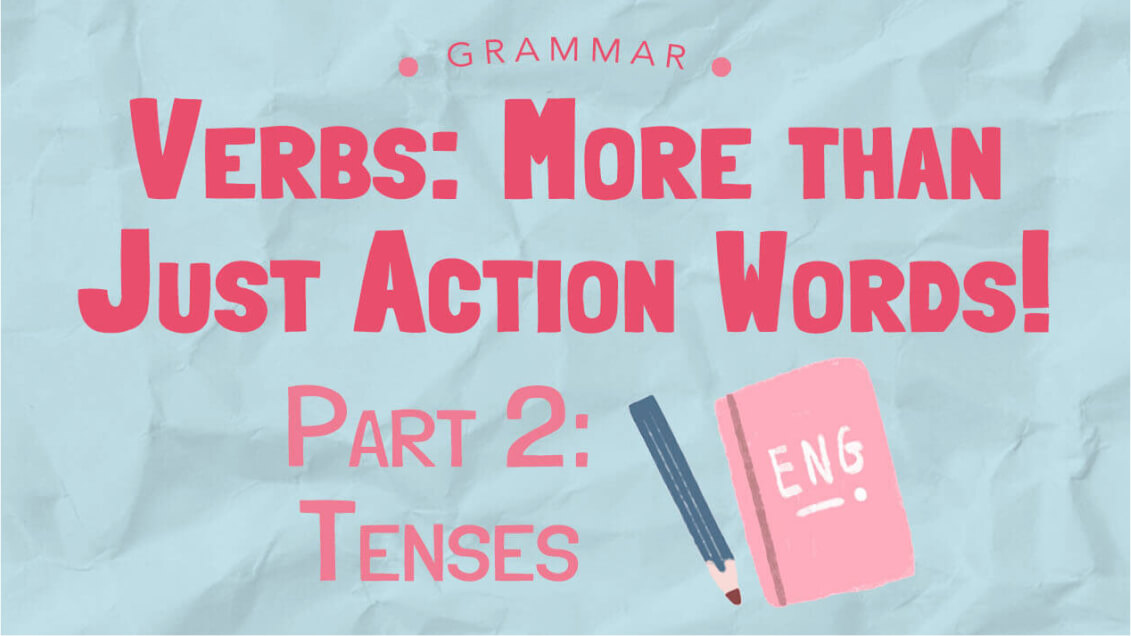
Verbs: More than Just Action Words! | Part 2: Tenses
2021 father’s day contest winners.
- Company News
Verbs: More than Just Action Words! | Part 1: Subject-Verb Agreement


10 Beautiful Words You Can Use in Narrative / Descriptive Writing | Secondary School
- Secondary School English

Ways To Create A Well-Rounded Character | Creative Writing
Understanding purpose-related questions in visual text comprehension.

How Playing Video Games Can Improve Our English (With Practical Tips for Parents!)

Primary School Composition | Onomatopoeia – What’s That?
2021 mother’s day contest winners + our founder’s journey (mother’s day special).
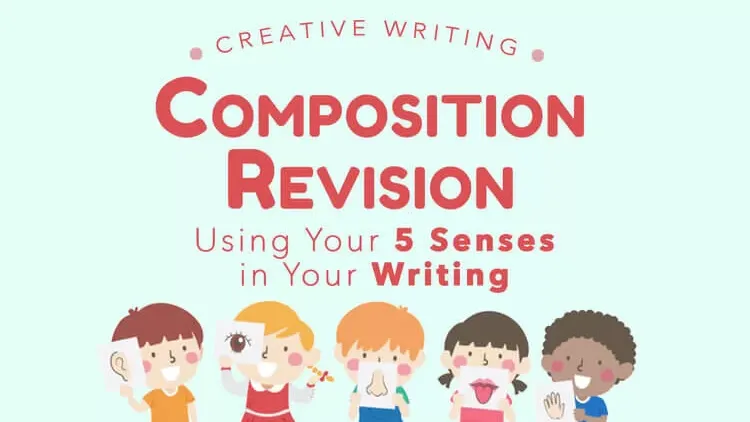
Composition Revision: Using Your 5 Senses in Your Writing
How to create a dynamic piece of writing using idioms, ketchup on english – subject-verb agreement, punctuation marks: colon vs. semicolon.

4 steps to Create Suspense

Earth Hour – Oral Topic
That simile though 2 | using stronger similes.

3 Tips for English Comprehension (Open-Ended)
- Comprehension

PSLE ORAL | Compiled Prelim 2021 Oral Topics + Questions!
- Free Downloads , Oral

5 Steps to Convert a Newspaper Article into a Cloze Passage
- Cloze Passage and Editing , Free Downloads , Primary School English

PSLE English | Oral Conversation: Free SG50 Sample Practice + Model Answers
- Free Downloads , Oral , Primary School English

PSLE English | Oral Conversation: Filling your Story with Details Easily + Free Revision Cards
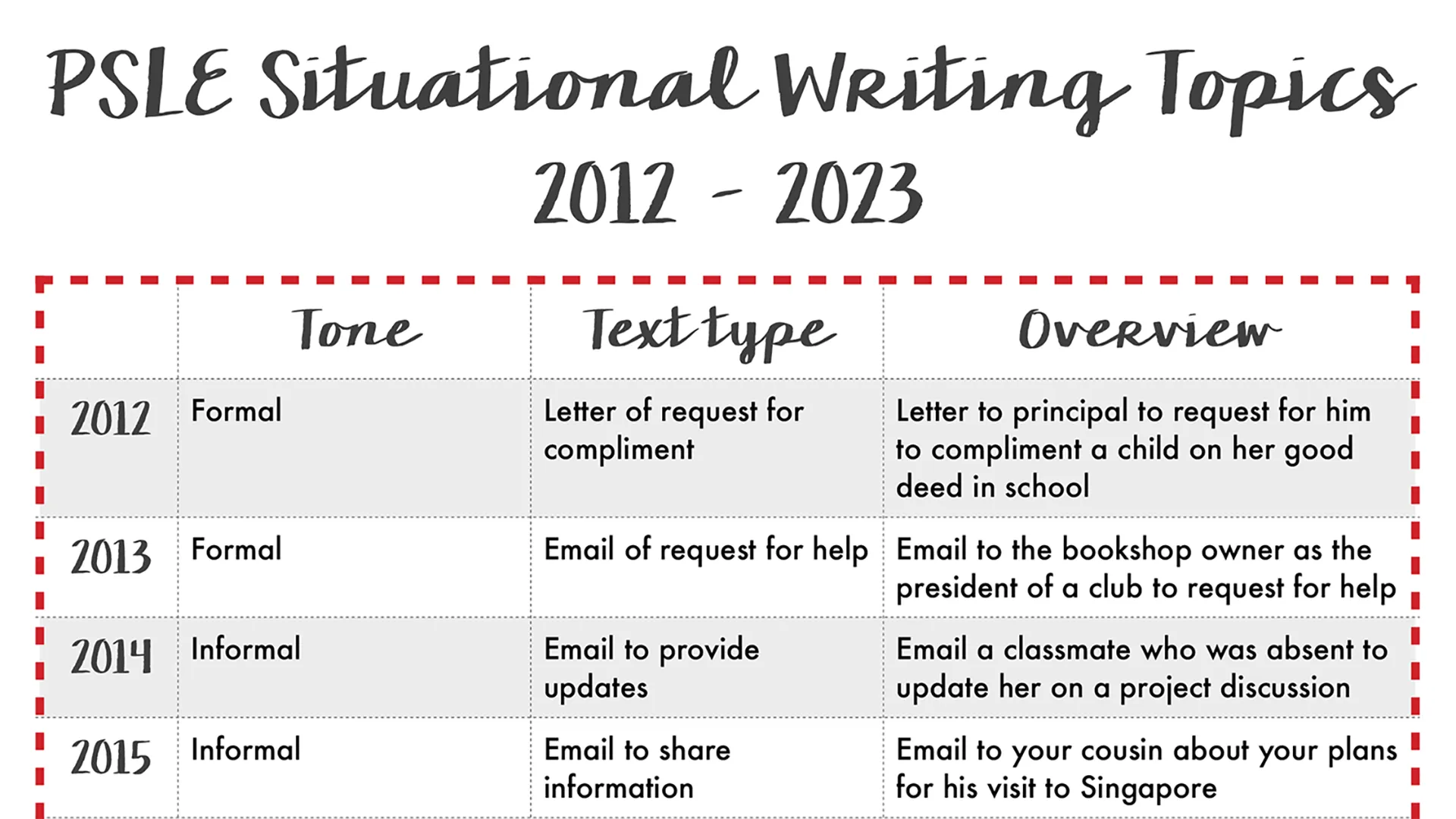
PSLE English | Situational Writing: Q&A + Formal vs Informal Writing Comparison Chart
- Free Downloads , Primary School English , Situational Writing

PSLE English Tips | Oral: Stimulus-Based Conversation Checklist

A Little Encouragement | DIY Motivational Bookmark (Easy to personalise too!)
- English in the real world , Free Downloads , Reading

Situational Writing: Step-by-Step Guide + Free Revision Card

I Love Reading | 5 Ways to Motivate Reluctant Readers
- English in the real world , Free Downloads

PSLE English | Printable Ultimate Grammar & Synthesis Summary
- Free Downloads , Grammar , Sentence Synthesis
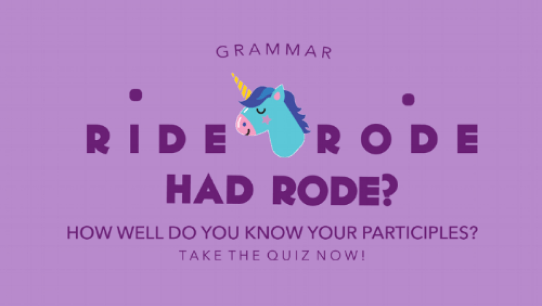
How Well Do You Know Your Past Participles?
- Free Downloads , Grammar

Primary Composition Writing | Starting Sentences with Introductory Clauses
- Creative Writing & Compo , Free Downloads

The Sentence Train | Lower Primary English

PSLE English Tips | Oral: Reading Checklist
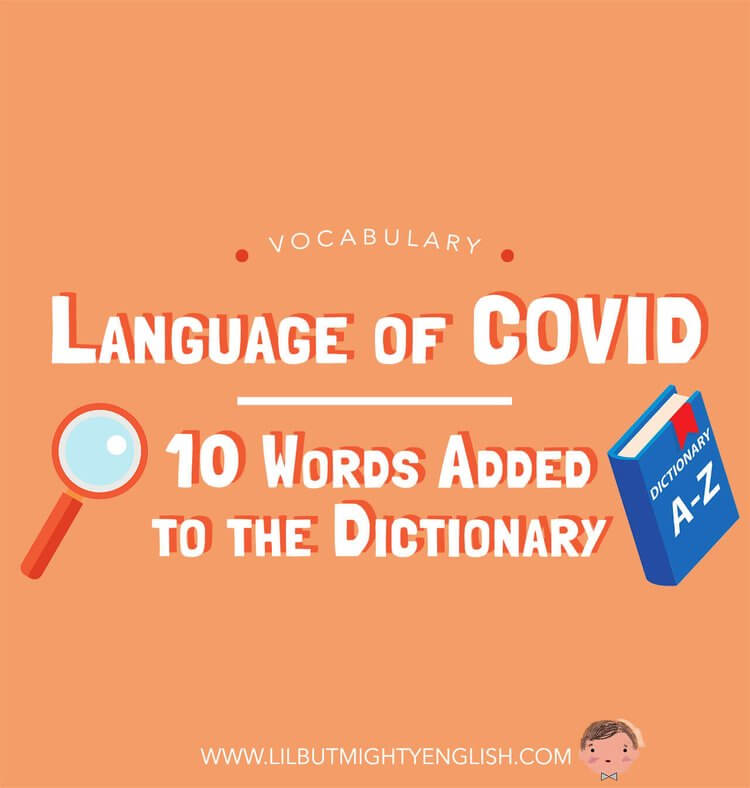
Language of COVID | 10 Words Added to the Dictionary
- English in the real world , Vocabulary

Using Personification to Show, Not Tell!
- Creative Writing & Compo , Primary School English
Expressing Character Feelings Too! | Using Show-Not-Tell (Part 2)
How to choose a book to read: 8 ways.

How to Dress Up A Boring Paragraph | Creative Writing
Ketchup on english – halloween special: prepositions of time.
- Lower Primary
Ketchup on English! – Verbs Are Not Just Action Words!

Expressing Character Feelings | Using Show-Not-Tell
Which picture should i use | choosing the best picture to use for composition.

Oral: Reading Passage | Long Vowels – Have You Been Reading Your Vowels Correctly?
Like what you are reading.
Subscribe now to receive news and tips hot off the press!
The greatest joy in giving small group tuition is a teacher’s ability to create greater impact in the children that have been entrusted to her care.
Our Programmes
- Primary English
- Secondary English
- Self-Paced Online Courses
- School Clients
- Copyright Terms & Conditions
- Personal Data Protection Policy
- Registration Terms & Conditions
- Contest Terms & Conditions
Lil’ but Mighty Clementi Block 432 Clementi Avenue 3, #01-282, Singapore 120432
Lil’ but Mighty Bukit Timah 170 Upper Bukit Timah Road, #B2-02 Bukit Timah Shopping Centre, Singapore 588179
Lil’ but Mighty Hougang Block 211 Hougang Street 21, #01-305 (Back entrance), Singapore 530211
Lil’ but Mighty Novena 1 Goldhill Plaza, #02-25, Singapore 308899
Lil’ but Mighty Marine Parade 1 Marine Parade, #04-05 Parkway Centre, Singapore 449408
Lil’ but Mighty Tampines 3 Tampines Central 1, #06-03 Tampines Plaza 1, Singapore 529540

Choose Your Test
Sat / act prep online guides and tips, 3 strong argumentative essay examples, analyzed.
General Education

Need to defend your opinion on an issue? Argumentative essays are one of the most popular types of essays you’ll write in school. They combine persuasive arguments with fact-based research, and, when done well, can be powerful tools for making someone agree with your point of view. If you’re struggling to write an argumentative essay or just want to learn more about them, seeing examples can be a big help.
After giving an overview of this type of essay, we provide three argumentative essay examples. After each essay, we explain in-depth how the essay was structured, what worked, and where the essay could be improved. We end with tips for making your own argumentative essay as strong as possible.
What Is an Argumentative Essay?
An argumentative essay is an essay that uses evidence and facts to support the claim it’s making. Its purpose is to persuade the reader to agree with the argument being made.
A good argumentative essay will use facts and evidence to support the argument, rather than just the author’s thoughts and opinions. For example, say you wanted to write an argumentative essay stating that Charleston, SC is a great destination for families. You couldn’t just say that it’s a great place because you took your family there and enjoyed it. For it to be an argumentative essay, you need to have facts and data to support your argument, such as the number of child-friendly attractions in Charleston, special deals you can get with kids, and surveys of people who visited Charleston as a family and enjoyed it. The first argument is based entirely on feelings, whereas the second is based on evidence that can be proven.
The standard five paragraph format is common, but not required, for argumentative essays. These essays typically follow one of two formats: the Toulmin model or the Rogerian model.
- The Toulmin model is the most common. It begins with an introduction, follows with a thesis/claim, and gives data and evidence to support that claim. This style of essay also includes rebuttals of counterarguments.
- The Rogerian model analyzes two sides of an argument and reaches a conclusion after weighing the strengths and weaknesses of each.
3 Good Argumentative Essay Examples + Analysis
Below are three examples of argumentative essays, written by yours truly in my school days, as well as analysis of what each did well and where it could be improved.
Argumentative Essay Example 1
Proponents of this idea state that it will save local cities and towns money because libraries are expensive to maintain. They also believe it will encourage more people to read because they won’t have to travel to a library to get a book; they can simply click on what they want to read and read it from wherever they are. They could also access more materials because libraries won’t have to buy physical copies of books; they can simply rent out as many digital copies as they need.
However, it would be a serious mistake to replace libraries with tablets. First, digital books and resources are associated with less learning and more problems than print resources. A study done on tablet vs book reading found that people read 20-30% slower on tablets, retain 20% less information, and understand 10% less of what they read compared to people who read the same information in print. Additionally, staring too long at a screen has been shown to cause numerous health problems, including blurred vision, dizziness, dry eyes, headaches, and eye strain, at much higher instances than reading print does. People who use tablets and mobile devices excessively also have a higher incidence of more serious health issues such as fibromyalgia, shoulder and back pain, carpal tunnel syndrome, and muscle strain. I know that whenever I read from my e-reader for too long, my eyes begin to feel tired and my neck hurts. We should not add to these problems by giving people, especially young people, more reasons to look at screens.
Second, it is incredibly narrow-minded to assume that the only service libraries offer is book lending. Libraries have a multitude of benefits, and many are only available if the library has a physical location. Some of these benefits include acting as a quiet study space, giving people a way to converse with their neighbors, holding classes on a variety of topics, providing jobs, answering patron questions, and keeping the community connected. One neighborhood found that, after a local library instituted community events such as play times for toddlers and parents, job fairs for teenagers, and meeting spaces for senior citizens, over a third of residents reported feeling more connected to their community. Similarly, a Pew survey conducted in 2015 found that nearly two-thirds of American adults feel that closing their local library would have a major impact on their community. People see libraries as a way to connect with others and get their questions answered, benefits tablets can’t offer nearly as well or as easily.
While replacing libraries with tablets may seem like a simple solution, it would encourage people to spend even more time looking at digital screens, despite the myriad issues surrounding them. It would also end access to many of the benefits of libraries that people have come to rely on. In many areas, libraries are such an important part of the community network that they could never be replaced by a simple object.
The author begins by giving an overview of the counter-argument, then the thesis appears as the first sentence in the third paragraph. The essay then spends the rest of the paper dismantling the counter argument and showing why readers should believe the other side.
What this essay does well:
- Although it’s a bit unusual to have the thesis appear fairly far into the essay, it works because, once the thesis is stated, the rest of the essay focuses on supporting it since the counter-argument has already been discussed earlier in the paper.
- This essay includes numerous facts and cites studies to support its case. By having specific data to rely on, the author’s argument is stronger and readers will be more inclined to agree with it.
- For every argument the other side makes, the author makes sure to refute it and follow up with why her opinion is the stronger one. In order to make a strong argument, it’s important to dismantle the other side, which this essay does this by making the author's view appear stronger.
- This is a shorter paper, and if it needed to be expanded to meet length requirements, it could include more examples and go more into depth with them, such as by explaining specific cases where people benefited from local libraries.
- Additionally, while the paper uses lots of data, the author also mentions their own experience with using tablets. This should be removed since argumentative essays focus on facts and data to support an argument, not the author’s own opinion or experiences. Replacing that with more data on health issues associated with screen time would strengthen the essay.
- Some of the points made aren't completely accurate , particularly the one about digital books being cheaper. It actually often costs a library more money to rent out numerous digital copies of a book compared to buying a single physical copy. Make sure in your own essay you thoroughly research each of the points and rebuttals you make, otherwise you'll look like you don't know the issue that well.

Argumentative Essay Example 2
There are multiple drugs available to treat malaria, and many of them work well and save lives, but malaria eradication programs that focus too much on them and not enough on prevention haven’t seen long-term success in Sub-Saharan Africa. A major program to combat malaria was WHO’s Global Malaria Eradication Programme. Started in 1955, it had a goal of eliminating malaria in Africa within the next ten years. Based upon previously successful programs in Brazil and the United States, the program focused mainly on vector control. This included widely distributing chloroquine and spraying large amounts of DDT. More than one billion dollars was spent trying to abolish malaria. However, the program suffered from many problems and in 1969, WHO was forced to admit that the program had not succeeded in eradicating malaria. The number of people in Sub-Saharan Africa who contracted malaria as well as the number of malaria deaths had actually increased over 10% during the time the program was active.
One of the major reasons for the failure of the project was that it set uniform strategies and policies. By failing to consider variations between governments, geography, and infrastructure, the program was not nearly as successful as it could have been. Sub-Saharan Africa has neither the money nor the infrastructure to support such an elaborate program, and it couldn’t be run the way it was meant to. Most African countries don't have the resources to send all their people to doctors and get shots, nor can they afford to clear wetlands or other malaria prone areas. The continent’s spending per person for eradicating malaria was just a quarter of what Brazil spent. Sub-Saharan Africa simply can’t rely on a plan that requires more money, infrastructure, and expertise than they have to spare.
Additionally, the widespread use of chloroquine has created drug resistant parasites which are now plaguing Sub-Saharan Africa. Because chloroquine was used widely but inconsistently, mosquitoes developed resistance, and chloroquine is now nearly completely ineffective in Sub-Saharan Africa, with over 95% of mosquitoes resistant to it. As a result, newer, more expensive drugs need to be used to prevent and treat malaria, which further drives up the cost of malaria treatment for a region that can ill afford it.
Instead of developing plans to treat malaria after the infection has incurred, programs should focus on preventing infection from occurring in the first place. Not only is this plan cheaper and more effective, reducing the number of people who contract malaria also reduces loss of work/school days which can further bring down the productivity of the region.
One of the cheapest and most effective ways of preventing malaria is to implement insecticide-treated bed nets (ITNs). These nets provide a protective barrier around the person or people using them. While untreated bed nets are still helpful, those treated with insecticides are much more useful because they stop mosquitoes from biting people through the nets, and they help reduce mosquito populations in a community, thus helping people who don’t even own bed nets. Bed nets are also very effective because most mosquito bites occur while the person is sleeping, so bed nets would be able to drastically reduce the number of transmissions during the night. In fact, transmission of malaria can be reduced by as much as 90% in areas where the use of ITNs is widespread. Because money is so scarce in Sub-Saharan Africa, the low cost is a great benefit and a major reason why the program is so successful. Bed nets cost roughly 2 USD to make, last several years, and can protect two adults. Studies have shown that, for every 100-1000 more nets are being used, one less child dies of malaria. With an estimated 300 million people in Africa not being protected by mosquito nets, there’s the potential to save three million lives by spending just a few dollars per person.
Reducing the number of people who contract malaria would also reduce poverty levels in Africa significantly, thus improving other aspects of society like education levels and the economy. Vector control is more effective than treatment strategies because it means fewer people are getting sick. When fewer people get sick, the working population is stronger as a whole because people are not put out of work from malaria, nor are they caring for sick relatives. Malaria-afflicted families can typically only harvest 40% of the crops that healthy families can harvest. Additionally, a family with members who have malaria spends roughly a quarter of its income treatment, not including the loss of work they also must deal with due to the illness. It’s estimated that malaria costs Africa 12 billion USD in lost income every year. A strong working population creates a stronger economy, which Sub-Saharan Africa is in desperate need of.
This essay begins with an introduction, which ends with the thesis (that malaria eradication plans in Sub-Saharan Africa should focus on prevention rather than treatment). The first part of the essay lays out why the counter argument (treatment rather than prevention) is not as effective, and the second part of the essay focuses on why prevention of malaria is the better path to take.
- The thesis appears early, is stated clearly, and is supported throughout the rest of the essay. This makes the argument clear for readers to understand and follow throughout the essay.
- There’s lots of solid research in this essay, including specific programs that were conducted and how successful they were, as well as specific data mentioned throughout. This evidence helps strengthen the author’s argument.
- The author makes a case for using expanding bed net use over waiting until malaria occurs and beginning treatment, but not much of a plan is given for how the bed nets would be distributed or how to ensure they’re being used properly. By going more into detail of what she believes should be done, the author would be making a stronger argument.
- The introduction of the essay does a good job of laying out the seriousness of the problem, but the conclusion is short and abrupt. Expanding it into its own paragraph would give the author a final way to convince readers of her side of the argument.

Argumentative Essay Example 3
There are many ways payments could work. They could be in the form of a free-market approach, where athletes are able to earn whatever the market is willing to pay them, it could be a set amount of money per athlete, or student athletes could earn income from endorsements, autographs, and control of their likeness, similar to the way top Olympians earn money.
Proponents of the idea believe that, because college athletes are the ones who are training, participating in games, and bringing in audiences, they should receive some sort of compensation for their work. If there were no college athletes, the NCAA wouldn’t exist, college coaches wouldn’t receive there (sometimes very high) salaries, and brands like Nike couldn’t profit from college sports. In fact, the NCAA brings in roughly $1 billion in revenue a year, but college athletes don’t receive any of that money in the form of a paycheck. Additionally, people who believe college athletes should be paid state that paying college athletes will actually encourage them to remain in college longer and not turn pro as quickly, either by giving them a way to begin earning money in college or requiring them to sign a contract stating they’ll stay at the university for a certain number of years while making an agreed-upon salary.
Supporters of this idea point to Zion Williamson, the Duke basketball superstar, who, during his freshman year, sustained a serious knee injury. Many argued that, even if he enjoyed playing for Duke, it wasn’t worth risking another injury and ending his professional career before it even began for a program that wasn’t paying him. Williamson seems to have agreed with them and declared his eligibility for the NCAA draft later that year. If he was being paid, he may have stayed at Duke longer. In fact, roughly a third of student athletes surveyed stated that receiving a salary while in college would make them “strongly consider” remaining collegiate athletes longer before turning pro.
Paying athletes could also stop the recruitment scandals that have plagued the NCAA. In 2018, the NCAA stripped the University of Louisville's men's basketball team of its 2013 national championship title because it was discovered coaches were using sex workers to entice recruits to join the team. There have been dozens of other recruitment scandals where college athletes and recruits have been bribed with anything from having their grades changed, to getting free cars, to being straight out bribed. By paying college athletes and putting their salaries out in the open, the NCAA could end the illegal and underhanded ways some schools and coaches try to entice athletes to join.
People who argue against the idea of paying college athletes believe the practice could be disastrous for college sports. By paying athletes, they argue, they’d turn college sports into a bidding war, where only the richest schools could afford top athletes, and the majority of schools would be shut out from developing a talented team (though some argue this already happens because the best players often go to the most established college sports programs, who typically pay their coaches millions of dollars per year). It could also ruin the tight camaraderie of many college teams if players become jealous that certain teammates are making more money than they are.
They also argue that paying college athletes actually means only a small fraction would make significant money. Out of the 350 Division I athletic departments, fewer than a dozen earn any money. Nearly all the money the NCAA makes comes from men’s football and basketball, so paying college athletes would make a small group of men--who likely will be signed to pro teams and begin making millions immediately out of college--rich at the expense of other players.
Those against paying college athletes also believe that the athletes are receiving enough benefits already. The top athletes already receive scholarships that are worth tens of thousands per year, they receive free food/housing/textbooks, have access to top medical care if they are injured, receive top coaching, get travel perks and free gear, and can use their time in college as a way to capture the attention of professional recruiters. No other college students receive anywhere near as much from their schools.
People on this side also point out that, while the NCAA brings in a massive amount of money each year, it is still a non-profit organization. How? Because over 95% of those profits are redistributed to its members’ institutions in the form of scholarships, grants, conferences, support for Division II and Division III teams, and educational programs. Taking away a significant part of that revenue would hurt smaller programs that rely on that money to keep running.
While both sides have good points, it’s clear that the negatives of paying college athletes far outweigh the positives. College athletes spend a significant amount of time and energy playing for their school, but they are compensated for it by the scholarships and perks they receive. Adding a salary to that would result in a college athletic system where only a small handful of athletes (those likely to become millionaires in the professional leagues) are paid by a handful of schools who enter bidding wars to recruit them, while the majority of student athletics and college athletic programs suffer or even shut down for lack of money. Continuing to offer the current level of benefits to student athletes makes it possible for as many people to benefit from and enjoy college sports as possible.
This argumentative essay follows the Rogerian model. It discusses each side, first laying out multiple reasons people believe student athletes should be paid, then discussing reasons why the athletes shouldn’t be paid. It ends by stating that college athletes shouldn’t be paid by arguing that paying them would destroy college athletics programs and cause them to have many of the issues professional sports leagues have.
- Both sides of the argument are well developed, with multiple reasons why people agree with each side. It allows readers to get a full view of the argument and its nuances.
- Certain statements on both sides are directly rebuffed in order to show where the strengths and weaknesses of each side lie and give a more complete and sophisticated look at the argument.
- Using the Rogerian model can be tricky because oftentimes you don’t explicitly state your argument until the end of the paper. Here, the thesis doesn’t appear until the first sentence of the final paragraph. That doesn’t give readers a lot of time to be convinced that your argument is the right one, compared to a paper where the thesis is stated in the beginning and then supported throughout the paper. This paper could be strengthened if the final paragraph was expanded to more fully explain why the author supports the view, or if the paper had made it clearer that paying athletes was the weaker argument throughout.

3 Tips for Writing a Good Argumentative Essay
Now that you’ve seen examples of what good argumentative essay samples look like, follow these three tips when crafting your own essay.
#1: Make Your Thesis Crystal Clear
The thesis is the key to your argumentative essay; if it isn’t clear or readers can’t find it easily, your entire essay will be weak as a result. Always make sure that your thesis statement is easy to find. The typical spot for it is the final sentence of the introduction paragraph, but if it doesn’t fit in that spot for your essay, try to at least put it as the first or last sentence of a different paragraph so it stands out more.
Also make sure that your thesis makes clear what side of the argument you’re on. After you’ve written it, it’s a great idea to show your thesis to a couple different people--classmates are great for this. Just by reading your thesis they should be able to understand what point you’ll be trying to make with the rest of your essay.
#2: Show Why the Other Side Is Weak
When writing your essay, you may be tempted to ignore the other side of the argument and just focus on your side, but don’t do this. The best argumentative essays really tear apart the other side to show why readers shouldn’t believe it. Before you begin writing your essay, research what the other side believes, and what their strongest points are. Then, in your essay, be sure to mention each of these and use evidence to explain why they’re incorrect/weak arguments. That’ll make your essay much more effective than if you only focused on your side of the argument.
#3: Use Evidence to Support Your Side
Remember, an essay can’t be an argumentative essay if it doesn’t support its argument with evidence. For every point you make, make sure you have facts to back it up. Some examples are previous studies done on the topic, surveys of large groups of people, data points, etc. There should be lots of numbers in your argumentative essay that support your side of the argument. This will make your essay much stronger compared to only relying on your own opinions to support your argument.
Summary: Argumentative Essay Sample
Argumentative essays are persuasive essays that use facts and evidence to support their side of the argument. Most argumentative essays follow either the Toulmin model or the Rogerian model. By reading good argumentative essay examples, you can learn how to develop your essay and provide enough support to make readers agree with your opinion. When writing your essay, remember to always make your thesis clear, show where the other side is weak, and back up your opinion with data and evidence.
What's Next?
Do you need to write an argumentative essay as well? Check out our guide on the best argumentative essay topics for ideas!
You'll probably also need to write research papers for school. We've got you covered with 113 potential topics for research papers.
Your college admissions essay may end up being one of the most important essays you write. Follow our step-by-step guide on writing a personal statement to have an essay that'll impress colleges.

Christine graduated from Michigan State University with degrees in Environmental Biology and Geography and received her Master's from Duke University. In high school she scored in the 99th percentile on the SAT and was named a National Merit Finalist. She has taught English and biology in several countries.
Student and Parent Forum
Our new student and parent forum, at ExpertHub.PrepScholar.com , allow you to interact with your peers and the PrepScholar staff. See how other students and parents are navigating high school, college, and the college admissions process. Ask questions; get answers.

Ask a Question Below
Have any questions about this article or other topics? Ask below and we'll reply!
Improve With Our Famous Guides
- For All Students
The 5 Strategies You Must Be Using to Improve 160+ SAT Points
How to Get a Perfect 1600, by a Perfect Scorer
Series: How to Get 800 on Each SAT Section:
Score 800 on SAT Math
Score 800 on SAT Reading
Score 800 on SAT Writing
Series: How to Get to 600 on Each SAT Section:
Score 600 on SAT Math
Score 600 on SAT Reading
Score 600 on SAT Writing
Free Complete Official SAT Practice Tests
What SAT Target Score Should You Be Aiming For?
15 Strategies to Improve Your SAT Essay
The 5 Strategies You Must Be Using to Improve 4+ ACT Points
How to Get a Perfect 36 ACT, by a Perfect Scorer
Series: How to Get 36 on Each ACT Section:
36 on ACT English
36 on ACT Math
36 on ACT Reading
36 on ACT Science
Series: How to Get to 24 on Each ACT Section:
24 on ACT English
24 on ACT Math
24 on ACT Reading
24 on ACT Science
What ACT target score should you be aiming for?
ACT Vocabulary You Must Know
ACT Writing: 15 Tips to Raise Your Essay Score
How to Get Into Harvard and the Ivy League
How to Get a Perfect 4.0 GPA
How to Write an Amazing College Essay
What Exactly Are Colleges Looking For?
Is the ACT easier than the SAT? A Comprehensive Guide
Should you retake your SAT or ACT?
When should you take the SAT or ACT?
Stay Informed
Get the latest articles and test prep tips!
Looking for Graduate School Test Prep?
Check out our top-rated graduate blogs here:
GRE Online Prep Blog
GMAT Online Prep Blog
TOEFL Online Prep Blog
Holly R. "I am absolutely overjoyed and cannot thank you enough for helping me!”
May 2023 Papers for CAIE Qualifications Available Now! Read More.
Cambridge O levels
Cambridge IGCSE
Cambridge Int'l AS & A Levels
📌 Update(s): 13/08/2023 NEW! AS/A Level latest papers added!
If any paper is still missing, please report using the Contact Us! tab.
- Other Resources
- Specimen Papers
Common Search Terms:
Resource Guide for File Naming System.
Click the image to view.
404 Not found
Get Free Trial Class

2019 O Level Model Essay
‘it was my proudest moment.’ write about a time when you felt like this..
2019 O Level English Examination Question
I was the last speaker to deliver my speech in the room. Our school team sat just a meter or so away, so nervous I could physically feel anxiety radiating from them. Every painful hour of training we submitted ourselves to was for this moment. So far, it had gone well: we had trounced so many of the so-called elite debate teams, cementing our status as the underdog. No one expected a team of seemingly-quiet girls to have come this far, but here we were, in the finals, against a team that had won the championship for ten years in a row.
Our coach held our hands tightly as we walked towards the lecture theatre where the results would be announced, reassuring us that we did well, and that accomplishing a guaranteed silver medal was still good enough. However, secretly in our heart of hearts, we hoped we would take the gold. Otherwise, what was all that training for?
I was so nervous I kept quiet, feeling the sweat trickle down the back of the school’s formal uniform that was set apart for only students who participate in the most prestigious competitions. My tie suddenly felt tight and uncomfortable, but I did not dare to loosen it and sully our image. Walking into the blessed air-conditioning of the lecture theatre, we sat down and awaited our fate. Unfortunately, we were seated next to our competitors, who kept pointing at us and laughing condescendingly, as if they were expecting the win.
“And the winner of the Singapore Debating Championships is…”
He trailed off into silence but I swore you could hear our collective hearts pounding in sheer anxiety.
When he cried out our school name, I could not even react. It was like an absolute dream when everyone started bursting into tears of joy, while I stared, stunned, until I finally realised what happened. We won. The underdogs won. We, the quiet, unassuming team that had just barely made it to this high-level division via the qualifiers won. Our competitors looked disgusted and refused to shake our hands, choosing instead to cast us looks of disdain.
It was then my team and I stepped forward with courage we never knew we had, and turned around to face our opponents.
“You will display proper gentlemanly behaviour and sportsmanship, or you will forever be known as bad losers,”
I managed to say, as politely as I could, even though I wanted to scream inside me. Staring them directly in the eye even though I was at least a head shorter than them, I refused to break my gaze.
Finally, they looked away, then embarrassedly stuck out their hands.
That was when I felt the proudest of myself and of my team. It was not the gold medal that went around our necks, not the championship trophy that we got to bring home, but the act of standing up against people who truly believed we would not make it. We had struggled through so much to make it this far and we deserved that respect. Even though we had to demand it, I still proudly reached out and shook their hands. From that day on, we would not just be known for our debating prowess, but for the fact that even though we seemed like pushovers, we were incredibly strong. Our gold medals shone brightly under the lights, but our faces and spirits shone ever brighter.
Total: 572 words
Teacher’s Commentary
- Building Tension We knew we were going to have fun with this question! We wanted to build up the tension and have it culminate at the point where we could describe where the writer was at her proudest.
- Championship Setting We picked a championship setting because it was the most relatable setting. We thought of setting it up so that it would seem that we were proudest because our hard work had won us the tournament.
- Competitor vs Home Team It was important to show the build-up as to how and why we were so proud. So, we developed the contrast between the main team and the competitor’s team.
- The Twist The climax was not the win as expected, but rather the moment where their characters were tested. Since the main team of the story was described as quiet and unassuming, speaking up against the more arrogant competitor’s team would be a surprise that no one would expect in the story.
- Reflection Finally, it was important to have some reflection as to why that was the proudest moment. This part would differentiate this writing from other students who chose the same 2019 O Level English examination topic. While other students would write about hard work paying off, we would talk about standing up for ourselves.
Get better English grades in the new syllabus
Master O Level English exam strategies that matter for secondary 1 to 4 students. With only 4 to 8 students in each class , students get maximum teacher’s attention.
Sign up for a $20 trial lesson to experience one of our classes.

Dear English Warriors,
We hope this blog post has been helpful to you.
If you don’t want to miss out new English tips, be sure to subscribe to our newsletter below.
To your success, The English Mastery Team
Similar Articles

12 Useful Vocabulary Phrases for Christmas

Do you find your child’s English syllabus too advanced?

5 Fun Ways to Improve Your English After the Exams
UEN 201937593E
Call/text us at 8709 7859
Visit our Facebook Page
Want Our Students' Model Essays?
Read A+ essays written by our students from different Secondary Schools all over Singapore.
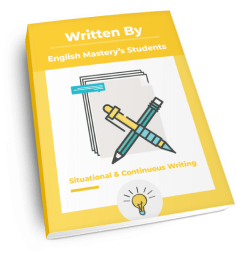
Copyright 2023 EnglishMastery.SG, All Rights Reserved. Privacy Policy & Terms
English Mastery helped me improved my grades, transforming my composition from a B4 to an A1 . The teacher is kind, encouraging, and understanding, creating a fun and engaging learning environment. Weekly classes are eagerly anticipated, with helpful notes and examples provided. Their focus on positive examples boosts learning , and their dedication to making lessons enjoyable is commendable. Highly recommend attending English Mastery lessons!
Ng Pei Xuan, Parent Certified Google Review
English Mastery’s dedication and in-house worksheets have led to notable improvement in my son’s English results . Their detailed progress reports identify strengths, weaknesses, and suggestions for improvement. Easy communication through their WhatsApp account adds to their helpful and friendly approach . Grateful for English Mastery’s support!
A C , Parent Certified Google Review
English Mastery provides valuable guidance for GCE ‘O’ level English. With ample resources and support, my son achieved a three-grade improvement, going from C5 to distinction . Grateful for English Mastery’s impact. Their engaging online lessons and timely feedback enhance skills and overcome challenges.
Isnarte Nordin, Parent Certified Google Review

O-LEVEL PAST YEARS COMPOSITION QUESTIONS
In our ‘O’ Level English Enrichment Programme, we ensure that our graduating students are ready to ace the English Language examination. It is a race against time to prepare for the ‘O’ Levels, hence our programme focuses on teaching and reinforcing our students’ essay writing skills, comprehension answer precision, summary writing and oral examination techniques. All W@W secondary teachers spare no effort in coaching our students how to tackle popular examination essay topics.
HALL OF FAME
Janice glanced worriedly at her wrist watch. The time was already ten past seven. She had twenty minutes to make it to school on time. The sky was overcast. A slight drizzle rained down like a mist. It started raining cats and dogs as Janice reached the bus stop. She had ignored her mother’s advice to take an umbrella with her. She wondered how she was going to make itto school in the rain.
Jovan Ang, Primary 2
Rulang Primary School
It was an idyllic Saturday morning. Fluffy white clouds hung in the clear cerulean sky. Granny Lucy was tottering to the market. Her heart was filled with light-hearted cheer and her mouth curled into a smile. She was looking forward to preparing a feast for her grandchildren, who were coming for dinner that night.
Kew Ling Wei, Primary 3
Raffles Girls’ Primary School
TESTIMONIALS
I am amazed at the depth of vocabulary my child has amassed since attending W@W. She has become a much more confident writer and can now write a full story with ease. She loves coming to lessons
Mr Calvin Tang
Parent of our Primary 3 student
OUR CENTRES
320 Clementi Ave 4 #01-15/27 Singapore 120320 (See Map )
OPENING HOURS
Monday – Friday: 11.00am to 7.00pm Saturday – Sunday: 9.00am to 6.00pm
WR!TERS@WORK PROGRAMMES
- O-level English Enrichment Programme (For Sec 3&4)
- Secondary English Enrichment Programme (For Sec 1&2)
- PSLE WRITING Programme
- Primary 6 English Enrichment Programme
- Primary 5 WRITING Programme
- Primary 5 English Enrichment Programme
- Primary 4 WRITING Programme
- Primary 3 WRITING Programme
- Primary 2 WRITING & English Programme
- Primary 1 WRITING & English Programme
- Junior WRITING Programme
Call us: 6774 2618 / 9684 3373 WhatsApp us: 8404 9281
Join the W@W community!
559 Bukit Timah Road #01-02B King’s Arcade Singapore 269695 (See Map )
Monday – Friday: 11.00am to 7.00pm Saturday – Sunday: 9.00am to 6.00pm
728 Ang Mo Kio Ave 6 #01-4220, Singapore 560728 (See Map )
Monday – Friday: 11.00am to 7.00pm Saturday – Sunday: 9.00am – 6.00pm
1 Marine Parade Central Parkway Centre #10-08 Singapore 449408 (See Map )
Monday – Tuesday and Thursday – Friday: 11.00am to 7.00pm Saturday – Sunday: 9.00am to 6.00pm Wednesday: CLOSED
300 Tampines Ave 5 #05-08 Tampines Junction Singapore 529653 (See Map )
Monday – Wednesday and Friday: 11.00am to 7.00pm Saturday – Sunday: 9.00am to 6.00pm Thursday : CLOSED
Ci Yuan Community Centre 51 Hougang Ave 9 #03-02 Singapore 538776 (See Map )
Monday – Friday : 11.00am to 7.00pm Saturday : 9.00am to 6.00pm Sunday : CLOSED
298 Tiong Bahru Road #06-02 Central Plaza Singapore 168730 (See Map )
Monday, Wednesday – Friday: 11.00am to 7.00pm Saturday: 9.00am to 6.00pm Tuesday and Sunday: Closed
Blk 284 Bishan St 22 #01-207 Singapore 570284 (See Map )
Monday – Friday: 11.00am to 7.00pm Saturday – Sunday: 9.00am to 6.00pm
12 Kallang Ave Aperia Mall, #03-02 Singapore 339511 (See Map )
+65 6774 2618 / 9684 3373
Monday - Wednesday: 11.00am to 7.00pm Thursday - Friday: 2.00pm to 9.00pm Saturday - Sunday: 9.00am to 6.00pm
559 Bukit Timah Road #01-02B King's Arcade Singapore 269695 (See Map )
+65 6463 2956 / 8600 2778
+65 62501906 / 8600 3815
+65 62433236 / 8600 3420
+65 86681924
Monday - Wednesday: 11.00am to 7.00pm Thursday - Friday: 2.00pm to 7.00pm Saturday - Sunday: 9.00am to 6.00pm
+65 62501906 / +65 8600 3815
Monday - Friday : 11.00am to 7.00pm Saturday : 9.00am to 6.00pm
© Copyright www.writersatwork.com.sg 2024, all rights reserved. By Orfeostory - Web Design & App Developer Singapore

GCE O-Level English 50 Model Essays
$ 12.90 $ 9.68 excl 9% GST (25% Discount)
Description
Additional information.
- Reviews (0)
Ace the GCE O-Level English with 50 Model Essays: Your Ultimate Guide to Essay Writing Success
Unlock your full potential in English essay writing with GCE O-Level English – 50 Model Essays, a comprehensive collection of model essays designed to prepare you for success in the O-Levels. Gain valuable insights into commonly tested topics, including science, technology, the arts, and social issues, and develop the skills necessary to excel at secondary school level essay writing.
Key features of this indispensable book:
- Expertly crafted model essays: Learn from 50 model essays, meticulously written to provide you with a clear understanding of what’s expected in a high-scoring O-Level essay.
- Diverse topics: Engage with a wide array of questions, ensuring that you’re well-prepared to tackle essays on science, technology, the arts, and social issues with confidence.
- Effective learning approach: Challenge yourself to attempt the essay questions before referring to the respective model essays, fostering a valuable feedback loop for continuous improvement.
- Targeted preparation: This book is specifically tailored to prepare you for the GCE O-Level English examination, offering ample examples of essay questions and answers that you can learn from.
Don’t let essay writing challenges hold you back from achieving your academic goals. Invest in the GCE O-Level English – 50 Model Essays and unlock the door to essay writing mastery.
Order now and elevate your essay writing skills to new heights, ensuring success in your English examinations. Let this exceptional resource guide you on your journey to linguistic excellence!
Publisher: CPD Singapore Education Services Pte Ltd
Author: Andrew Smith
ISBN: 9789811413100
Price: SGD 12.90
There are no reviews yet.
You must be logged in to post a review.
You may also like…
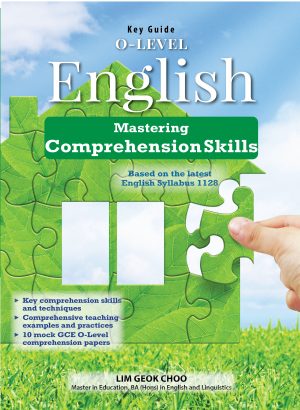
Key Guide O-Level English: Mastering Comprehension Skills
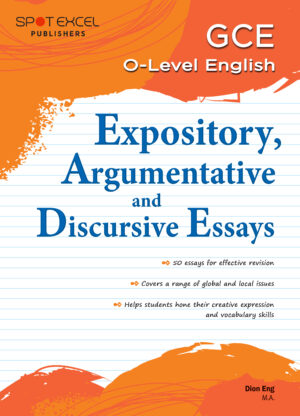
GCE O-Level English Expository, Argumentative and Discursive Essays
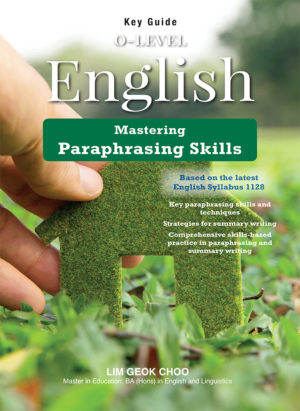
Key Guide O-Level English: Mastering Paraphrasing Skills
Related products.
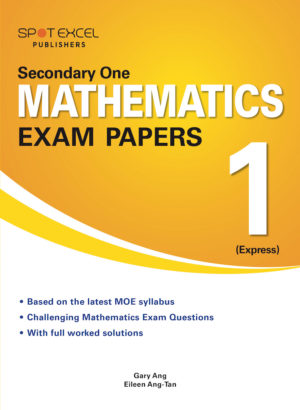
Sec 1 E Math Exam Paper (Express)
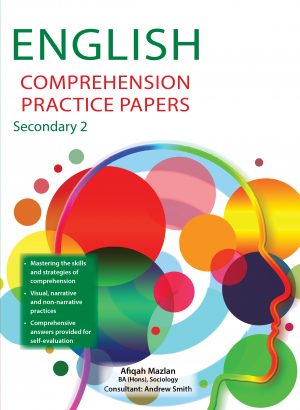
English Comprehension Practice Papers Secondary 2
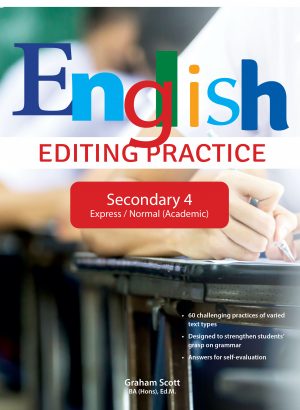
English Editing Practice Secondary 4 Express/Normal(Academic)

IMAGES
VIDEO
COMMENTS
An argumentative essay is a genre of writing in which you either speak in favour of a topic or against it. Here is a step-by-step guide on writing this essay. ... Remember that this topic is very important from an examination point of view for GCE O Level English (1123). So, do practise a couple of past paper questions as well. Thank you for ...
Good question, Answer: it will ask to state your opinion and there must be two sides, this would give you the judgement to chosse argumentative essay or writing atleast what im aware of doing 511 english as second lang. IGCSE CAIE, to test this view cheack the past papers of your subject code whether 500 first lang. Or whatever cheack the past papers avalable to test this view, normally ...
In this video, you will learn how to write the best argumentative essay for O Level and IGCSE English. ️ Narrative Writing Made Simple: https://www.youtube....
Argumentative Essay Examples for O Level. The course outline for O levels is quite tough. O levels students need to have a good command of the English language and amazing writing skills. If you are an O-level student, the following examples will guide you on how to write an argumentative essay.
For all its benefits though, argumentative writing can come off as tricky to some. However, with this step-by-step guide, you can be well on your way towards drafting effective and compelling argumentative essays in no time. Following are just some of the elements of argumentative writing. How to outline an Argumentative Essay:
Make a claim. Provide the grounds (evidence) for the claim. Explain the warrant (how the grounds support the claim) Discuss possible rebuttals to the claim, identifying the limits of the argument and showing that you have considered alternative perspectives. The Toulmin model is a common approach in academic essays.
Argumentative Essays are one of the options on the O Level English Language Writing paper. They can be tricky. Watch this video to get a better idea of how t...
Figure 1. When writing an argumentative essay, students must be able to separate emotion based arguments from logic based arguments in order to appeal to an academic audience. Argumentative essays are quite common in academic writing and are often an important part of writing in all disciplines. You may be asked to take a stand on a social ...
Writing a paragraph. Introduction and conclusion. Counter paragraph. Editing. This series is a comprehensive online tuition guide, taking you through all the key elements you need for a good piece of argumentative essay writing. This series is particularly relevant to secondary school students struggling with their English curriculum.
An argumentative essay attempts to convince a reader to agree with a particular argument (the writer's thesis statement). The writer takes a firm stand one way or another on a topic and then uses hard evidence to support that stance. An argumentative essay seeks to prove to the reader that one argument —the writer's argument— is the ...
In this lecture of Educate A Change - Free Lecture Series - Sir Hunain Zia (World Record Holder: 11 World Records, 7 Distinctions and 66 A and A*) will conti...
In conclusion, understanding the difference and knowing the marking requirements for argumentative and expository essays, are essential for O Level English essay writing success. Armed with this knowledge, you can tailor your writing approach to meet the requirements of each essay type, effectively conveying your thoughts and ideas.
An expository essay is one that explores and considers in depth the different aspects and perspectives to a particular topic or subject matter. We typically see two types of expository essays appearing in the O Level examination: argumentative and discursive essays. 5.
The Cambridge O Level English Language syllabus enables learners to communicate accurately, appropriately and effectively and to understand and respond appropriately and imaginatively to what they read and experience. They will employ different forms of writing to suit a range of purposes and will show that they can understand the content and argument of given texts.
Personal recount essay. Descriptive essay. Reflective essay. Discursive essay. Argumentative essay. 1. Narrative Essay. As the name suggests, the goal of the narrative essay is to narrate a fictional story. However, that doesn't mean you can't sprinkle in some personal experiences to spice up your writing.
Argumentative Essay Example 2. Malaria is an infectious disease caused by parasites that are transmitted to people through female Anopheles mosquitoes. Each year, over half a billion people will become infected with malaria, with roughly 80% of them living in Sub-Saharan Africa.
CAIE Past Papers for Cambridge O Level, Cambridge Int'l AS and A Level and Cambridge IGCSE subjects May 2023 Papers for CAIE Qualifications Available Now! ... Past Papers, O Levels English (1123) Question Papers, O Levels English (1123) Marking Schemes, O Levels English (1123) Grade Thresholds . Resource Guide for File Naming System. Click the ...
That's enigma the Notch A1 in O-Level English Explainer, Argumentative and Discursive Model Essays book is a must-have for any apprentice looking to excel in their exams. Those book is packed with a variety of model essays covering a range of commonly trial topics, like in Technology, Schooling, and the Arts.
This Unit should be done after Unit 1 but it can come before Unit 2 or after Unit 4, at the discretion of the teacher and dependent on the preference and skill of the. students. Outline. The Unit explores examples of good discursive and argumentative writing and encourages students to analyse these. It takes students through the process whereby.
Get better English grades in the new syllabus. Master O Level English exam strategies that matter for secondary 1 to 4 students. With only 4 to 8 students in each class, students get maximum teacher's attention. Sign up for a $20 trial lesson to experience one of our classes. Our classes & fees.
In our 'O' Level English Enrichment Programme, we ensure that our graduating students are ready to ace the English Language examination. It is a race against time to prepare for the 'O' Levels, hence our programme focuses on teaching and reinforcing our students' essay writing skills, comprehension answer precision, summary writing and oral examination techniques.
Description. Elevate Your Essay Writing Skills with GCE O-Level English Expository, Argumentative and Discursive Essays. Unlock your full potential in English essay writing with this exceptional compilation of essays designed to help you perfect your skills in preparation for your O-Level examinations.
Prepare: organize thoughts, craft a thesis, decide on arguments and evidence. Draft: outline an essay, start with an engaging introduction, delve into arguments, and conclude like a boss. Revise: polish the draft, optimize and restructure if necessary, use precise language, and double-check all points.
GCE O-Level English - 50 Model Essays is a collection of 50 model essays designed to present students with insights on commonly tested topics, including science, technology, the arts and science. ... GCE O-Level English Expository, Argumentative and Discursive Essays. Rated 0 out of 5 $ 9.90 $ 7.43 excl 9% GST (25% Discount) Add to basket;